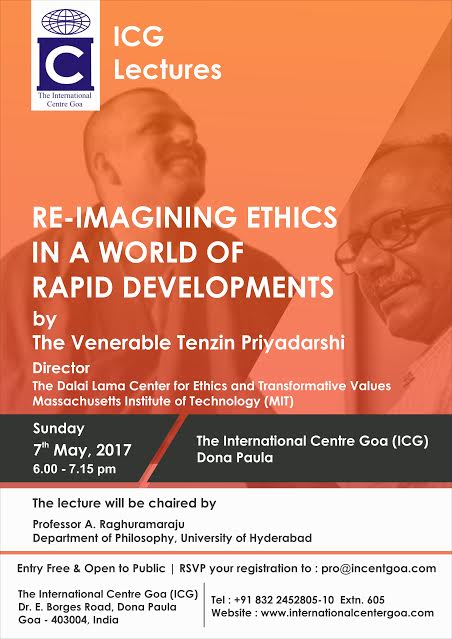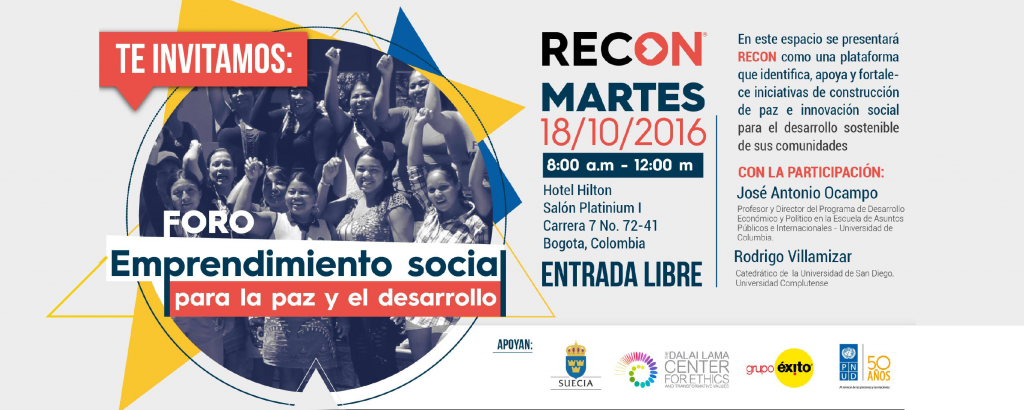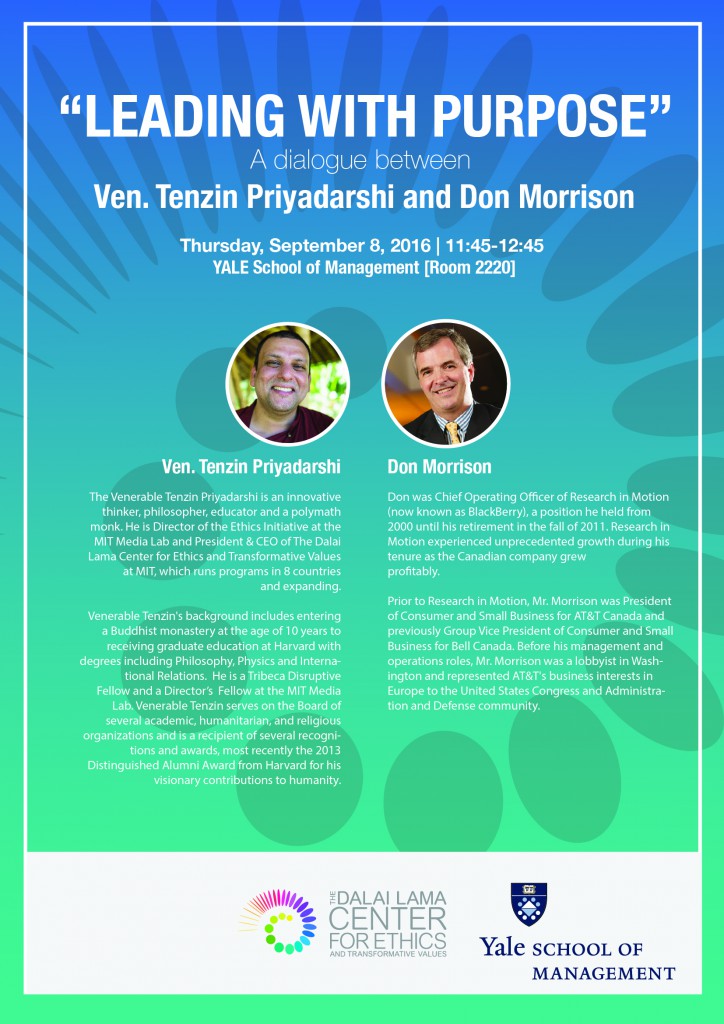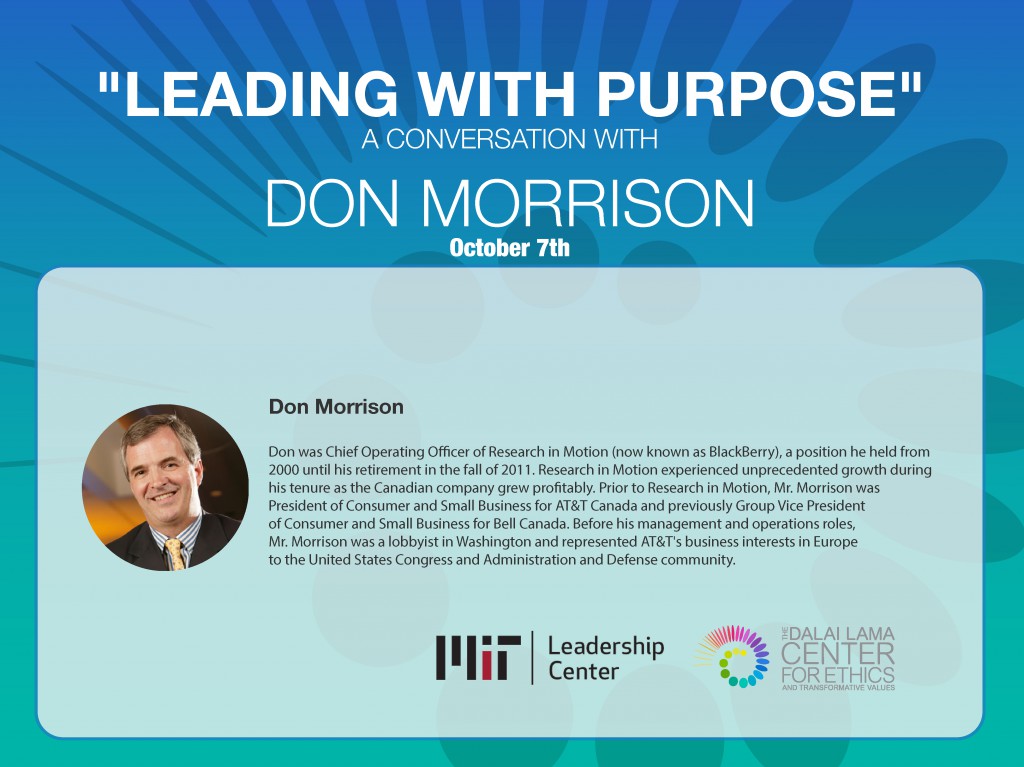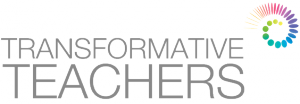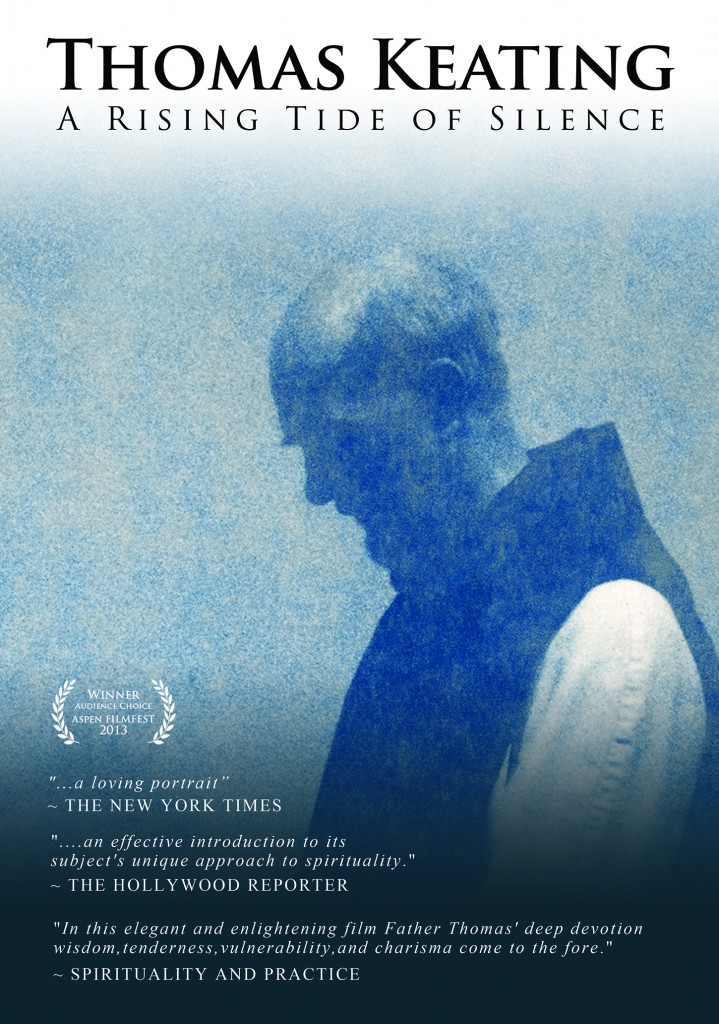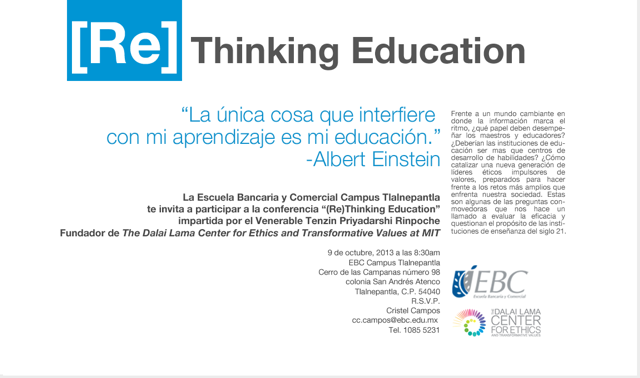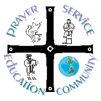Transformative Teachers U
July 19-21, 2017
Venue: Universidad del Rosario, Bogota, Colombia
Transformative Leadership
July 19, 2017
Venue: MIT Media Lab
Taught as part of Open Leadership Camp for Director’s Fellows at MIT Media Lab.
Transformative Teachers
July 8-9, 2017
Venue: MIT, Cambridge, MA
The Creative Ethics of Cognitive Intelligence
Jason Jercinovic, Astrid Boutaud & Tenzin Priyadarshi
June 19, 2017
Venue: Cannes Creativity Festival, Cannes, France.
Ethics and AI
Keynote at Cognitive Computing Summit
Tenzin Priyadarshi
Thursday, June 15, 2017
Venue: California
Transformative Teachers U
May 19-21, 2017
Venue: Universidad del Rosario, Bogota, Colombia
Ethics and Transformative Values in Public Service
A Round-Table Conversation with Civil Servants and NGO Leaders
Friday, February 12, 2017
Venue: Hyderabad, India
(Re)Imagining Ethics in a World of Rapid Developments
The Venerable Tenzin Priyadarshi
Sunday, May 7th, 2017
Venue: International Centre Goa, India
Moral Urgency of Non-Violent Movements
Conversations with Marshall Ganz & Joi Ito
May 2, 2017 at 10:30AM
Venue: MIT Media Lab (E14-3rd Floor Atrium)
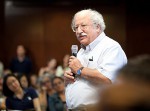
Marshall Ganz grew up in Bakersfield, California, where his father was a Rabbi and his mother, a teacher. He entered Harvard College in the fall of 1960. He left a year before graduating to volunteer with the 1964 Mississippi Summer Project. He found a “calling” as an organizer for the Student Nonviolent Coordinating Committee, and, in the fall of 1965, joined Cesar Chavez in his effort to unionize California farm workers. During 16 years with the United Farm Workers he gained experience in union, political, and community organizing, became Director of Organizing, and was elected to the national executive board on which he served for 8 years. During the 1980s, he worked with grassroots groups to develop new organizing programs and designed innovative voter mobilization strategies for local, state, and national electoral campaigns. In 1991, in order to deepen his intellectual understanding of his work, he returned to Harvard College and, after a 28-year “leave of absence,” completed his undergraduate degree in history and government. He was awarded an MPA by the Kennedy School in 1993 and completed his PhD in sociology in 2000. As senior lecturer in public policy at the Kennedy School of Government, he teaches, researches, and writes on leadership, organization, and strategy in social movements, civic associations, and politics. He has published in the American Journal of Sociology, American Political Science Review, American Prospect,Washington Post, Los Angeles Times and elsewhere. His newest book, Why David Sometimes Wins: leadership, organization and strategy in the California farm worker movement was published in 2009, earning the Michael J. Harrington Book Award of the American Political Science Association. He was awarded an honorary doctorate in divinity by the Episcopal Divinity School in 2010.
Marshall Ganz also teaches “Leadership, Organizing and Action: Leading Change” an online program designed to help leaders of civic associations, advocacy groups and social movements learn how to organize communities that can mobilize power to make change.
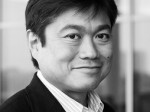
Joichi “Joi” Ito has been recognized for his work as an activist, entrepreneur, venture capitalist, and advocate of emergent democracy, privacy, and internet freedom. As director of the MIT Media Lab, and a Professor of the Practice in Media Arts and Sciences, he is currently exploring how radical new approaches to science and technology can transform society in substantial and positive ways.
Soon after coming to MIT, Ito introduced mindfulness meditation training to the Media Lab. Together with The Venerable Tenzin Priyadarshi, Ito is promoting the contribution that awareness and focus can bring to the creativity process.
Ito is Chairman of the Board of PureTech and as served as both board chair and CEO of Creative Commons. He sits on the boards of Sony Corporation, the John S. and James L. Knight Foundation, the John D. and Catherine T. MacArthur Foundation, and The New York Times Company. In Japan, he is visiting executive researcher of KEIO SFC, and he was a founder of Digital Garage, and helped establish and later became CEO of the country’s first commercial Internet service provider.
Compassionate Activism: Contemplative Roots of Non-Violence
Conversations with Robert AF Thurman and Tenzin Priyadarshi
Tuesday,May 2 at 6:30PM
Venue: MIT Media Lab (E14-3rd Floor Atrium)
Robert A.F. Thurman is the Jey Tsong Khapa Professor of Indo-Tibetan Buddhist Studies at
Columbia University, President of the
Tibet House U.S., a non-profit organization dedicated to the preservation and promotion of Tibetan civilization which he co-founded with Richard Gere and Philipp Glass.
Time chose Professor Thurman as one of its 25 most influential Americans in 1997. The New York Times recently said Thurman “is considered the leading American expert on Tibetan Buddhism.” He was the first western Tibetan monk and studied with the Dalai Lama which resulted in a friendship spanning more than 40 years.
Professor Thurman is a prolific author of several best-sellers.
(This event will be followed by a book signing of Prof. Thurman’s latest book, a graphic novel “Man of Peace”)
Ethics, Values & Wellbeing | A Talk by His Holiness the Dalai Lama
Meditation, Aesthetics, and Expression (MIT-IAP 2017)
Karole Armitage and Tenzin Priyadarshi
Tuesday, January 24, 2017 (3PM-5PM)
Venue: MIT Media Lab
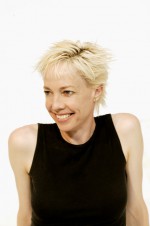
Karole Armitage, artistic director of the New York-based Armitage Gone! Dance Company, is renowned for pushing the boundaries to create contemporary works that blend dance, music, science, and art to engage in philosophical questions about the search for meaning. Rigorously trained in classical ballet, she has performed in Balanchine’s Grand Théâtre de Genève Company and in the Merce Cunningham Dance Company. As a choreographer, Armitage has created productions for the New York Philharmonic at Lincoln Center and many companies, from the Bolshoi Ballet in Moscow to the Ballet de L’Opéra de Paris to the Tasmanian Dance Company in Australia. Armitage’s work is at once both esoteric and popular. She has choreographed Broadway productions (Passing Strange and Hair), videos for Madonna and Michael Jackson, several films for Merchant Ivory productions, and the Cirque du Soleil production, Amaluna. A recipient of a Guggenheim Fellowship, Armitage was named a Commandeur de l’Ordre des Arts et des Lettres, France’s most prestigious award in 2009, and she holds an honorary Doctorate of the Arts from the University of Kansas (2013). She is currently a Radcliffe Fellow at Harvard University and a Simons Fellow at The University of Kansas, studying Native American plains culture.
The Creative process continues to be a mystery to many of us. For some, it has to do with self-expression and communicating with the world around us. For others, it is an intimate and meditative path that guides them through life. Join Media Lab’s Director’s Fellows
Karole Armitage and
Tenzin Priyadarshi in an open conversation as they share their thoughts on creativity, meditation, self-awareness, the role ego can play in the creative process, and the transcending values of art.
This is an interactive conversation (not a lecture). Participation from the attendees is encouraged.
Max. number of participants: 20
In partnership with MIT Media Lab Director’s Fellows Program.Transformative Leadership (Mexico)
People, Power & Purpose
December 6-8, 2016
Venue: Mexico-city, Mexico
Film Screening and Conversation: Under the Turban (MIT)
Wednesday, November 30, 2016 at 7PM
Venue: Wong Auditorium, Tang Center, MIT
DIRECTOR: SATINDER GARCHASatinder is the founder and chief executive of Elevations Development Pte Ltd., a boutique property developer known for it’s high-end, impeccably designed residences. With an interest in pairing upscale properties with artistic innovation Satinder has partnered with some of the world’s most renown architects and designers such as Zhaha Hadid, Robert Stern and Anouska Hemple in creating the building and interiors for the Elevations’ Properties.
An entrepreneur at heart, Satinder began his career creating the company
People.com in 1995.
People.com brought together his background in computer science with the burgeoning needs of the Silicon Valley’s then recent creation, the Internet.
People.com, a human resources company paired the needs of the emerging cyber world with programmers and developers in India. In 2000 Satinder sold the company and moved to Singapore where he currently resides.
Interested in questions about identity in the global era, this film is Satinder’s personal investigation into Sikhism. This is his first documentary feature.
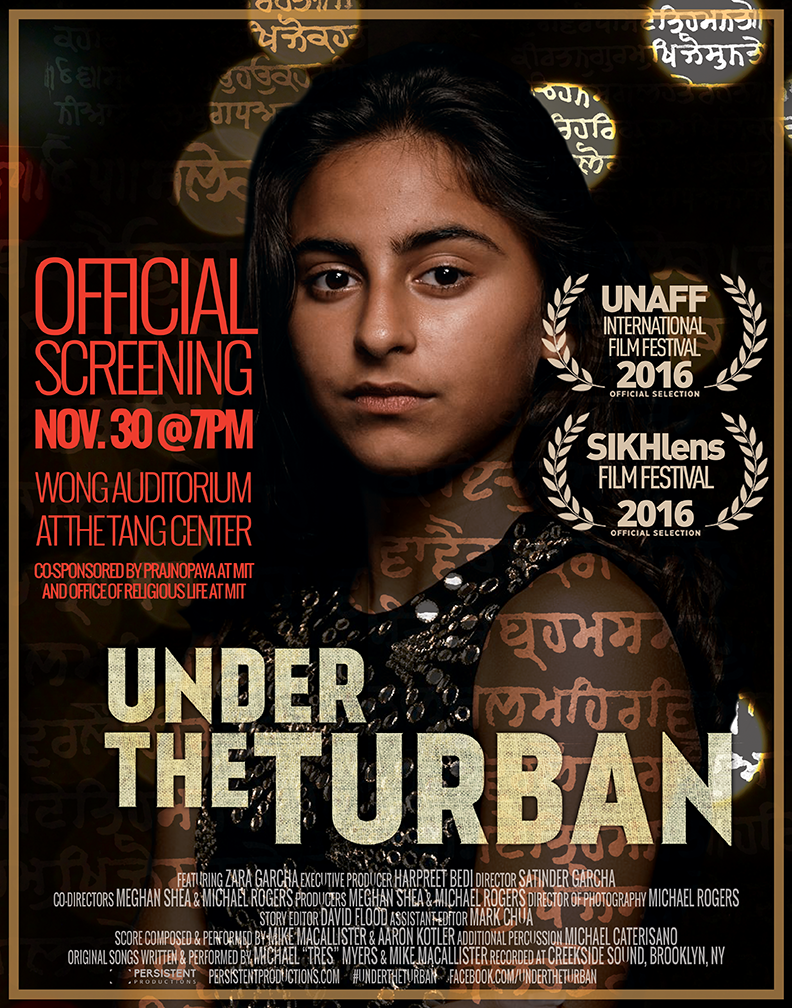
Followed by conversations with Director Satinder Garcha
ReThinking Values in Education (Chennai, India)
The Venerable Tenzin Priyadarshi
November 21, 2016 at 9AM
Venue: St. Franis Hall, Stella Maris College, Chennai (India)
Uncompromising Ethics For Compromised World (India)
Conversations with HE Samdhong Rinpoche and Venerable Tenzin Priyadarshi
November 19, 2016 at 6PM
Venue: Madras School of Economics, Chennai
Co-sponsored by Chennai International Center.
ReThinking Education
Talk by Venerable Tenzin Priyadarshi
October 21, 2016
Venue: Hawaii Convention Center
Social Entrepreneurship for Peace and Development (Colombia)
October 18, 2016
Venue: Bogota, Colombia
There Is No AI Ethics: What Machine Prejudice Teaches Us About Ourselves
Professor Joanna Bryson
Monday, October 17, 2016 (3PM-4:30PM)
Venue: E14-240, MIT
Abstract:
While many scan the foreseeable time horizon looking for killer robots with glowing eyes, or for amorphous superintelligent puppet masters, humanity has been quietly augmenting itself with artificial intelligence for decades if not centuries. To understand the long-term consequences of AI we need first to better examine our present. Here in joint work with Aylin Caliskan-Islam and Arvind Narayanan I show that human-like semantic biases are present in standard the standard NLP tools GloVe and word2vec applied to their standard Web-sourced corpora. We have replicated a spectrum of standard human biases as exposed by the Implicit Association Test and other well-known psychological studies. Our results indicate that language itself contains recoverable and accurate imprints of our historic biases, whether these are morally neutral as towards insects or flowers, problematic as towards race or gender, or even simply veridical, reflecting the status quo for the distribution of gender with respect to careers or first names. These regularities are captured by machine learning along with the rest of semantics. I will describe these results, and also their implications both for human and AI ethics, which I will argue should be considered as one.
Bio:
Joanna Bryson is a Reader (tenured Associate Professor) at the University of Bath, currently visiting Princeton’s Center for Information Technology Policy (CITP). She has broad academic interests in the structure and utility of intelligence, both natural and artificial. She is best known for her work in systems AI and AI ethics, both of which she began during her PhD in the 1990s, but she and her colleagues publish broadly, into biology, anthropology, sociology, philosophy, cognitive science, and politics. She is currently collaborating on a project funded by Princeton’s University Center for Human Values, “Public Goods and Artificial Intelligence”, with Alin Coman of Princeton Psychology and Mark Riedl of Georgia Tech. This project includes both basic research in human sociality and experiments in technological interventions. Other current research includes work on understanding the causality behind the link between wealth inequality and political polarization, work on transparency in AI systems, and work on machine prejudice deriving from human semantics. She holds degrees in Psychology from Chicago and Edinburgh, and in Artificial Intelligence from Edinburgh and MIT. At Bath she founded the Intelligent Systems research group (one of four in the Department of Computer Science) and heads their Artificial Models of Natural Intelligence.Sponsor(s): MIT Media Lab Scalable Cooperation Group
Transformative Teachers (Colombia)
September 21-23, 2016
Venue: Bogota, Colombia
Transformative Leadership (Yale)
Friday, September 9, 2016
Venue: Yale SOM, New Haven CT
Leading with Purpose
Don Morrison and Tenzin Priyadarshi
Thursday, September 8, 2016
Venue: Yale SOM, New Haven, CT
Ethical Leadership (India)
Power, Trust and Citizenship Building
August 23, 2016 at 11AM
Venue: National Police Academy, Hyderabad, India
Leading with Purpose (India)
August 23, 2016
Venue: Hyderabad, India
Refining Problems for Innovative Solutions
Monday, August 22, 2016 at 5:30PM
Venue: T-Hub, Hyderabad, India
Compassionate Young Leaders | PA
August 8-10, 2016
Venue: Newtown, PA
Transformative Leadership | Mexico-city
August 4-6, 2016
Venue: Mexico-city
Transformative Teachers | Cambridge, MA
Compassionate Young Leaders
July 6-8, 2016
Venue: Newtown, PA
In partnership with The Project for STEM Foundation Competitiveness
Transformative Leadership (Mexico-city)
May 19-21, 2016
Venue: EBC, Mexico-city
James Doty, MD: Into the Magic Shop
A Neurosurgeon's Quest to Discover the Mysteries of the Brain and the Secrets of the Heart
James Doty, MD and Tenzin Priyadarshi
Thursday, April 21, 2016 at 7PM
Venue: MIT Simmons Hall (MPR)
James R. Doty, M.D., is a professor in the Department of Neurosurgery at Stanford University and the director of the Center for Compassion and Altruism Research and Education (CCARE), where he researches the neuroscience of compassion and altruism. He is also a philanthropist funding health clinics throughout the world and has endowed scholarships and chairs at multiple universities. He serves on the board of a number of nonprofits, including the Charter for Compassion International and the Dalai Lama Foundation.
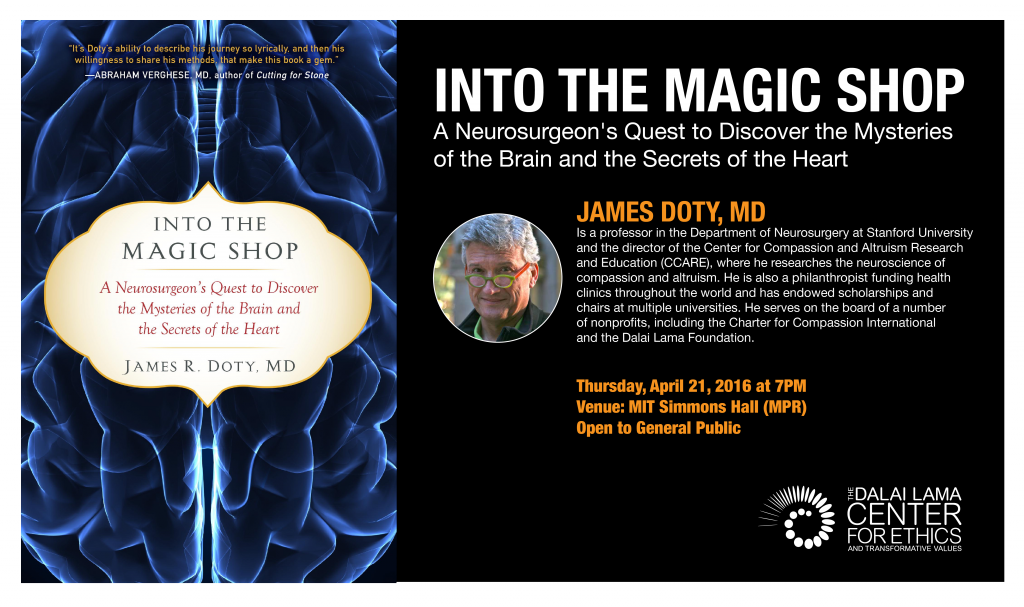 Co-sponsored by Resident Scholars @ MIT Simmons Hall, MIT ORL and Prajnopaya.
Co-sponsored by Resident Scholars @ MIT Simmons Hall, MIT ORL and Prajnopaya.Transformative Leadership (Stanford)
Transformative Leadership (Yale SOM)
April 8-9, 2016
Venue: Yale School of Management, New Haven
Shaka Senghor: Writing My Wrongs
Shaka Senghor, Joi Ito, Tenzin Priyadarshi
Wednesday, March 16, 2016 | 6:00pm
Venue: MIT Media Lab, Bartos Theater
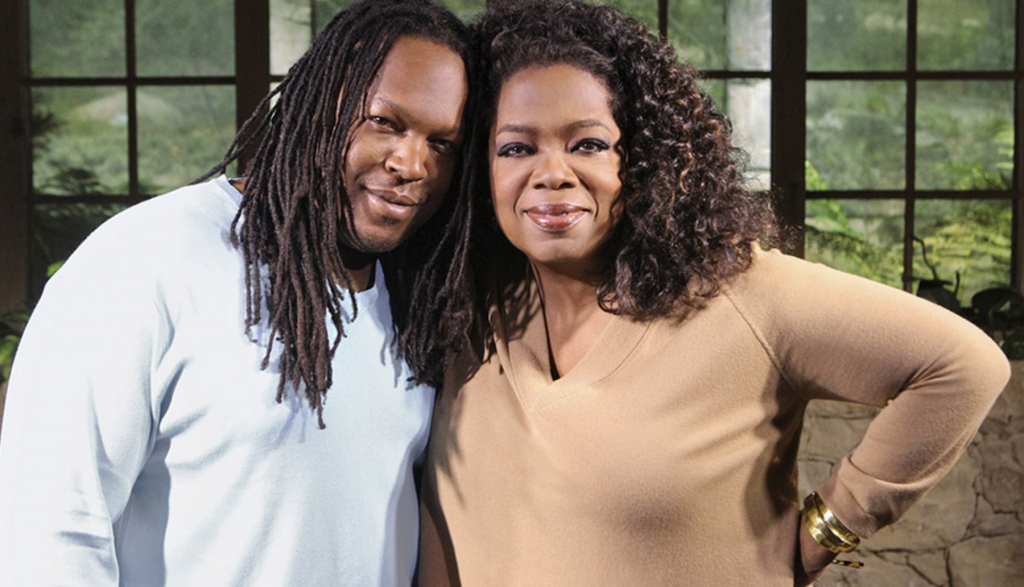
In 1991, Shaka Senghor was sent to prison for second-degree murder. Today, he is a lecturer at universities, a leading voice on criminal justice reform, and an inspiration to thousands.
In life, it’s not how you start that matters. It’s how you finish.
Shaka Senghor was raised in a middle class neighborhood on Detroit’s east side during the height of the 1980s crack epidemic. An honor roll student and a natural leader, he dreamed of becoming a doctor—but at age 11, his parents’ marriage began to unravel, and the beatings from his mother worsened, sending him on a downward spiral that saw him run away from home, turn to drug dealing to survive, and end up in prison for murder at the age of 19, fuming with anger and despair.
Writing My Wrongs is the story of what came next. During his nineteen-year incarceration, seven of which were spent in solitary confinement, Senghor discovered literature, meditation, self-examination, and the kindness of others—tools he used to confront the demons of his past, forgive the people who hurt him, and begin atoning for the wrongs he had committed. Upon his release at age thirty-eight, Senghor became an activist and mentor to young men and women facing circumstances like his. His work in the community and the courage to share his story led him to fellowships at the MIT Media Lab and the Kellogg Foundation and invitations to speak at events like TED and the Aspen Ideas Festival.
In equal turns,
Writing My Wrongs is a page-turning portrait of life in the shadow of poverty, violence, and fear; an unforgettable story of redemption, reminding us that our worst deeds don’t define us; and a compelling witness to our country’s need for rethinking its approach to crime, prison, and the men and women sent there.
Transformative Teachers (Mexico)
Tenzin Priyadarshi and Peter Stidwill
March 11-12, 2016
Venue: EBC, Mexico-city
Extraordinary Leadership: Transforming Yourself to Transform Others
Tenzin Priyadarshi
Wednesday, March 2, 2016 at 6PM IST
Venue: Hyderabad, India
Transformative Leadership (Mexico)
January 28-30, 2016
Venue: Querétaro, Mexico
Education for Peace: Compassionate Young Leaders (Colombia)
December 4-5, 2015
Venue: Colombia
Co-sponsor(s): FENALPER, USAID, El Spectador
Transformative Teachers (Mexico)
Venue: Mexico-city
Transformative Leadership (Mexico)
November 19-21, 2015
Venue: Queretaro, Mexico
Geek Heresy: What’s Essential in an Age of Advanced Technology
Kentaro Toyama
Tuesday, November 3, 2015 at 4:30PM
Venue: Bartos Theater, MIT
Kentaro Toyama is W.K. Kellogg Associate Professor at the University of Michigan School of Information, a fellow of the Dalai Lama Center for Ethics and Transformative Values at MIT, and author of Geek Heresy: Rescuing Social Change from the Cult of Technology. In previous lives, he co-founded Microsoft Research India and taught at Ashesi University in Ghana.
Abstract:
Over the last four decades, America experienced a golden age of digital innovation. Yet during the same span of time, the rate of poverty stayed put, social mobility stagnated, and inequality skyrocketed to levels not seen for a century. How is it that our most advanced technologies failed to impact our deepest social challenges?
This talk presents technology’s Law of Amplification — a simple idea that explains why gadgets alone consistently fail to deliver social progress, and why in an age of advanced technology, it’s all the more important to focus on nurturing human wisdom.
Leading with Purpose
Wednesday, October 7, 2015 | 5:00 pm
Venue: MIT Sloan (E51, Room 335)
BREATHE Hackathon Weekend
September 19-20, 2015
Compassionate Young Leaders: Global Mauliola
September 14-18, 2015
Venue: The Kohala Center, Hawai'i
For several years, The Kohala Center, the Edith Kanaka‘ole Foundation, and the Dalai Lama Center for Ethics and Transformative Values at MIT have been in conversation about the possibility of connecting ancestral knowledge with research to address critical issues at the intersection of human and natural systems and science. These include energy self-reliance and food self-reliance. With a powerful and indigenous foundation of living in abundant self-reliance, of humanity living in kinship with nature, Hawai‘i operates with a spirit of aloha, a sense of generosity and care in communities both human and natural. And this despite the fact that Hawai‘i Island currently imports 85% of the food consumed on the island and is 95% dependent on fossil fuels for the production of energy. This dependence has a tremendous impact on the socio-economic and environmental health of Hawai‘i and the physical and spiritual health of its people. Thus, Hawai‘i models contemporary challenges, as well as indigenous success, with regard to sustainability and the well-being of our entire island planet.
Transformative Leadership (Queretaro, Mexico)
September 3-5, 2015
Venue: Queretaro, Mexico
Transformative Leadership (Mexico-city, Mexico)
August 27-29, 2015
Venue: Mexico-city
Young Peace Leaders (Colombia)
August 18-25, 2015
Venue: Universidad del Rosario, Bogota, Colombia
Games for Ethics and Character Development: A Workshop at MIT
Transformative Leadership (Mexico)
a program on secular ethics and leadership for executives
July 2-4, 2015
Venue: EBC, Mexico-city
Transformative Teachers (US)
A Program for Transformative Teachers: Cultivating Resilient and Ethical Young Leaders
Summer 2015
Ethics and Wisdom
The Venerable Tenzin Priyadarshi
June 18, 2015
Venue: Suntec City, Singapore
Wisdom 2.0 Asia Conference
ReThinking Leadership: A Contemplative Approach
The Venerable Tenzin Priyadarshi
June 17, 2015
Venue: Google, Singapore
Economic Dimensions of Gender Inequality
Augusto Lopez-Claros
June 11, 2015 at 7PM
Since March of 2011 Augusto López-Claros is Director of Global Indicators and Analysis with the World Bank Group. He was Chief Economist and Director of the Global Competitiveness Program at the World Economic Forum in Geneva, where he was the editor of the Global Competitiveness Report, the Forum’s flagship publication, as well as a number of regional economic reports. Before joining the Forum he was Executive Director with Lehman Brothers (London) and Senior International Economist. He was the International Monetary Fund’s resident representative in the Russian Federation during 1992-95. Before joining the IMF, he was professor of economics at the University of Chile in Santiago. López-Claros was educated in England and the United States, receiving a diploma in Mathematical Statistics from Cambridge University and a Ph.D. in Economics from Duke University.
He is the author of numerous articles and papers on international economic issues, including: The Search for Efficiency in the Adjustment Process: Spain in the 1980s; The European Monetary System: Developments and Perspectives (co-author); Fiscal Policy Issues During the Transition in Russia, Ten Years of Russian Economic Reform; Reforming the IMF; Interdependence, Cooperation, and the Emergence of Global Institutions; Chile: the Next State of Development; The Role of International Financial Organizations During the Transition in Russia; Israel: Factors in the Emergence of an ICT Powerhouse (co-author); The Innovation Capacity Index: Factors, Policies, and Institutions Driving Country Innovation, and many others. His interests include the role of interdependence and cooperation in the emergence of global institutions, elements of a successful approach to economic development, and aspects of management of the globalization process.
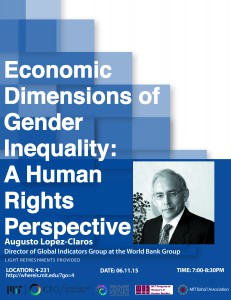
Transformative Leadership (Cornell)
May 1-2, 2015
Venue: Cornell University
Creativity and Healthy Aging
Joi Ito, Tenzin Priyadarshi, Maryanne Kirkbride, David Vago
April 21, 2015 at 4:30PM
Venue: Tang Center, MIT
Recent Global Temperature Trends: What do they tell us about anthropogenic climate change?
Jochem Marotzke, Max-Planck Institut Für Meteorologie
Wednesday, April 15, 2015 | 5:00 pm
Venue: MIT Wong Auditorium, E51-115
Observations suggest a hiatus in global surface temperature rise since 1998, whereas most climate models simulate continued warming. What causes this difference? Do climate models respond too sensitively to the increase in greenhouse-gas concentrations such as that of CO2, and thus overestimate climate change systematically? Or has the discrepancy arisen by chance? And what is the relevance of this discrepancy for our assessment of long-term anthropogenic climate change?
In my lecture I will first illustrate the physically fundamental manifestation of anthropogenic climate change: the ocean’s heat content increases because of the greenhouse effect from rising greenhouse-gas concentrations. This increase in heat content has gone on unabated for at least the past forty years. Then I will show that differences between different model simulations – and hence also differences between simulations and observations – are dominated by chance events if we consider temperature changes over periods as short as fifteen years. By contrast, it matters little whether models respond more or less sensitively to increasing greenhouse-gas concentrations, if we only consider changes over fifteen years. The difference between simulated and observed global surface temperature changes during the hiatus period thus tells us very little about model capability or lack thereof, and as an indicator of anthropogenic climate change the surface-warming hiatus is largely irrelevant.
Sponsored by the MIT Department of Earth, Atmospheric and Planetary Sciences and the Center for Global Change Science
How Can Young People Take Ownership of Their Future? A Lecture by Dr. James Hansen
James Hansen
Tuesday, April 14, 2015 | 4:00 pm
Venue: MIT Wong Auditorium E51-115
Dr. James Hansen, formerly Director of the NASA Goddard Institute for Space Studies, is an Adjunct Professor at Columbia University’s Earth Institute, where he directs the
Program on Climate Science, Awareness and Solutions. He was trained in physics and astronomy in the space science program of Dr. James Van Allen at the University of Iowa. His early research on the clouds of Venus helped identify their composition as sulfuric acid. Since the late 1970s, he has focused his research on Earth’s climate, especially human-made climate change. Dr. Hansen is best known for his testimony on climate change to congressional committees in the 1980s that helped raise broad awareness of the global warming issue. He was elected to the National Academy of Sciences in 1995 and was designated by Time Magazine in 2006 as one of the 100 most influential people on Earth. He has received numerous awards including the Carl-Gustaf Rossby and Roger Revelle Research Medals, the Sophie Prize and the Blue Planet Prize. Dr. Hansen is widely recognized for his efforts to outline actions that the public must take to protect the future of young people and other life on our planet.
Transformative Leadership (Mexico)
April 9-11, 2015
Venue: Mexico-city
Compassion, Technology, & Environment | A Talk by the Karmapa
His Holiness the XVIIth Gyalwang Karmapa
March 17, 2015 at 5PM
Venue: Memorial Auditorium, Stanford University
Gyalwang Karmapa is the head of the 900 year old Karma Kagyu school of Tibetan Buddhism and guide to millions of Buddhists around the world.
In addition to being a scholar and meditation master, as well as painter, poet, songwriter and playwright, the Gyalwang Karmapa is an avid environmentalist.
Click here to register.
Co-sponsored with CCARE at Stanford University
Tiny Cells, Global Impact
43rd James R. Killian Jr. Faculty Award Lecture
Professor Sallie Chisholm, Lee and Geraldine Martin Professor of Environmental Studies in the Department of Civil and Environmental Engineering and the Department of Biology
Tuesday, March 10, 2015 (4PM-5:30PM
The James R. Killian Jr. Faculty Achievement Award was established in 1971 to recognize extraordinary professional accomplishments by full-time members of the MIT faculty. It is the greatest honor the faculty can bestow upon one of its members. A faculty committee chooses the recipient from among candidates nominated by their peers for outstanding contributions to their fields, to MIT, and to society.
Transformative Leadership (Mexico)
February 19-21, 2015
Venue: EBC, Mexico-city
Human Rights, Ethics and Values: On Personal and Social Transformation
A Talk by Venerable Tenzin Priyadarshi
February 17, 2015
Venue: University of Alabama, Birmingham
Transformative Teachers
A Program for Transformative Teachers: Cultivating Resilient and Ethical Young Leaders
February 17, 2015
Venue: Birmingham, Alabama
Transformative Teachers (India)
January 22-23, 2015
Venue: India Habitat Center, New Delhi
Program open to active middle an high school teachers in India. In partnership with Foundation for Universal Responsibility, New Delhi.

Transformative Leadership (Mexico-city)
November 27-29, 2014
Venue: Mexico-city
Leading with Purpose (Mexico-city)
Conversations with Don Morrison and Tenzin Priyadarshi
Tuesday, November 25, 2014
Venue: EBC, Mexico-city
Don Morrison is the former Chief Operating Officer of Research In Motion. Don oversaw all domestic and international operations focusing on the development and execution of a world-class, customer-driven organization to support the BlackBerry wireless solution. Before joining RIM in 2000, Don undertook a number of senior leadership positions in Canada, the United States, Europe and the Middle East with AT&T and Bell Canada. Don is the founder of the Golden Thread Charitable Foundation and the Morrison Centre for Peace and Conflict Research. He is on the board of HealthyKids International and is a member of the Strategic Planning Committee for SickKids Hospital Foundation. Don holds an MBA and BA from the University of Toronto and also participated in the Executive Program at the University of Virginia, Darden Business School.
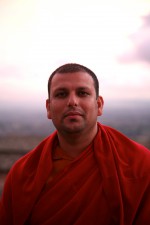
By most accounts, The Venerable Tenzin Priyadarshi is an innovative thinker, a philosopher educator, a philanthropist, a polymath and a monk. He is the Founding Director of The Dalai Lama Center for Ethics and Transformative Values at the Massachusetts Institute of Technology, a center dedicated to inquiry, dialogue, and education on the ethical and humane dimensions of life. As a collaborative and nonpartisan think tank, its programs emphasize responsibility and examine meaningfulness and moral purpose between individuals, organizations, and societies. The Center at MIT has 6 Nobel Peace Laureates as its founding members and its programs run in 8 countries and expanding.
Venerable Tenzin’s unusual background encompasses entering a Buddhist monastery at the age of 10 years to receiving graduate education at Harvard withe degrees ranging from Philosophy to Physics to International Relations.
Venerable Tenzin serves on the Board of several academic, humanitarian, and religious organizations. He is a recipient of several recognitions and awards, most recent of which is a 2013 Distinguished Alumni Award from Harvard for his visionary contributions to humanity.
The Ethics of Shared Values
Conversations with Pir Zia Inayat Khan and Venerable Tenzin Priyadarshi
Friday, November 7, 2014 at 7PM
Venue: Simmons Hall MPR, MIT
PIR ZIA INAYAT-KHAN is a scholar and teacher of Sufism in the lineage of his grandfather, Hazrat Inayat Khan. He received his B.A. (Hons) in Persian Literature from the London School of Oriental and African Studies, and his M.A. and Ph.D. in Religion from Duke University. Pir Zia is president of the Sufi Order International and founder of Suluk Academy, a school of contemplative study with branches in the United States and Europe. He is also founder of the interspiritual institute Seven Pillars House of Wisdom. He lives with his wife and two children in rural upstate New York.
By most accounts, The Venerable Tenzin Priyadarshi is an innovative thinker, a philosopher educator, a philanthropist, a polymath and a monk. He is the Founding Director of The Dalai Lama Center for Ethics and Transformative Values at the Massachusetts Institute of Technology, a center dedicated to inquiry, dialogue, and education on the ethical and humane dimensions of life. As a collaborative and nonpartisan think tank, its programs emphasize responsibility and examine meaningfulness and moral purpose between individuals, organizations, and societies. The Center at MIT has 6 Nobel Peace Laureates as its founding members and its programs run in 8 countries and expanding.Venerable Tenzin serves on the Board of several academic, humanitarian, and religious organizations. He is a recipient of several recognitions and awards, most recent of which is a 2013 Distinguished Alumni Award from Harvard for his visionary contributions to humanity.
Change-Makers for a Better World
Science, Monks, & Technology Leadership
October 12-15, 2014
Venue: India
In partnership with Sager Family Foundation and LTWA.
Workshop on Games for Ethics and Character Development (MA)
Peter Stidwill & Lacey Hilliard
Saturday, September 27, 2014 at 9AM
Venue: Building 56, Room 114, MIT
Click here to register.(Limited Enrollment. No refund will be processed after August 10, 2014)
You will receive a registration confirmation email upon payment. If you have not received a confirmation email, you are not registered. Participants are encouraged to bring their own laptop or iPad.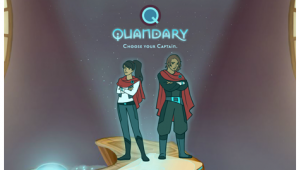 Instructors: Peter Stidwill & Lacey Hillard
Instructors: Peter Stidwill & Lacey HillardQUANDARY: Leveraging game-based learning to develop ethical thinking and decision making skills
QUANDARY, an award-winning game from the Learning Games Network, is a game that encourages players to think ethically as they lead a human colony struggling for survival on fictional planet Braxos. The game’s goal is to provide an engaging experience for players aged 8-14 to strengthen foundational skills – including perspective-taking, decision making and critical thinking – that help them recognize ethical issues and deal with ethical situations in their own lives.
In this workshop, we’ll explore how to integrate QUANDARY into the classroom by playing the game, viewing and discussing teacher example videos and tips, and reviewing players’ feedback. We’ll also look at extension ideas and support material available on the web, including teacher and player created scenarios. We’ll pull-out the concepts and design under-pinning the game: why we chose the dilemmas that are featured; why it was set on a fictional planet; how the scoring works; how we encourage discussion and reflection; what ethical theories underpin the game.
Participants will:• Play the game
• Watch video clips of the game in use and kids’ reactions
• Hear how the game was designed
• Discuss one of the ethical dilemmas presented in the game
• Discuss how the game can be used in the classroom, and hopefully suggest and share new thoughts and extensions
Participants will gain:• Confidence in using Quandary in their classroom, including tips and strategies that can be applied to game-based learning more generally
• Knowledge about the types of dilemmas and support materials available to facilitate ethical discussions in the classroom
• An understanding of the ethical research and frameworks used for the game (plus an opportunity to debate these choices and game design)
• An insight into the design and use of learning games
This workshop is part of The Center’s Young Peace Leaders Program. Transformative Leadership (Yale)
September 25-26, 2014
Venue: Yale School of Management, New Haven
Conversations on Ethics and Leadership
Heidi Brooks, Rodrigo Canales, & Tenzin Priyadarshi
Thursday, September 25, 2014 at 6PM
Venue: Yale SOM
HEIDI BROOKS SPECIALIZES IN LEADERSHIP AND COMMUNITY DEVELOPMENT for individuals, organizations, and larger systems. Her experience includes executive coaching and leadership development in Fortune 500 companies, academic institutions, family firms, and non-profit organizations.
Since 2003, she has been on the faculty at the Yale School of Management, where she is the faculty director the Global Pre-MBA Leadership Program. Her courses include: Interpersonal Dynamics, Managing Teams and Groups, Leadership Development, Emotional Intelligence and Coaching Skills for Managers. In recent years, she spearheaded the original leadership development curriculum design and directed both the Leadership Development Program and the SOM Mentoring Program.
Dr. Brooks has a PhD in psychology from the University of California at Berkeley and a BA from Brown University. When she is not with her family or on the tennis court, Heidi is usually engaged in building courageous leadership communities.
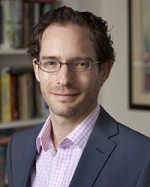
Rodrigo Canales researches the role of institutions in entrepreneurship and economic development. Specifically, Rodrigo studies how individuals purposefully change complex organizations or systems. In particular, Rodrigo’s work explores how individuals’ backgrounds, professional identities, and organizational positions affect how they relate to existing structures and the strategies they pursue to change them. His work contributes to a deeper understanding of the mechanisms that allow institutions to operate and change. Rodrigo has done work in entrepreneurial finance and microfinance. As he continues his work on microfinance he is also conducting research in the institutional complexities of renewable energy and the institutional implications of the Mexican war on drugs. Rodrigo teaches the Innovator Perspective at Yale SOM; he sits in the advisory board of the Dalai Lama Center for Ethics and Transformative Values at MIT; and he advises several startups in Mexico that seek to improve the financing environment for small firms.

By most accounts, The Venerable Tenzin Priyadarshi is an innovative thinker, a philosopher educator, a philanthropist, a polymath and a monk. He is the Founding Director of The Dalai Lama Center for Ethics and Transformative Values at the Massachusetts Institute of Technology, a center dedicated to inquiry, dialogue, and education on the ethical and humane dimensions of life. As a collaborative and nonpartisan think tank, its programs emphasize responsibility and examine meaningfulness and moral purpose between individuals, organizations, and societies. The Center at MIT has 6 Nobel Peace Laureates as its founding members and its programs run in 8 countries and expanding.
Venerable Tenzin’s unusual background encompasses entering a Buddhist monastery at the age of 10 years to receiving graduate education at Harvard withe degrees ranging from Philosophy to Physics to International Relations.
Venerable Tenzin serves on the Board of several academic, humanitarian, and religious organizations. He is a recipient of several recognitions and awards, most recent of which is a 2013 Distinguished Alumni Award from Harvard for his visionary contributions to humanity.
Digital Learning: Improving Access to Learning and Holistic Educational Outcomes
Sanjay Sarma, Jonathan Haber, Justin Reich. Moderated by Scot Osterweil (MIT)
Tuesday, September 23, 2014 (4:30PM-6PM)
Venue: Building 4, Room 231, MIT
Jonathan Haber
Educational researcher, writer, recovering entrepreneur, and chief learner at Degree of Freedom
Jonathan Haber is a writer/researcher (and recovering entrepreneur) who has worked in the fields of professional assessment, employment, curriculum development and educational technology. His Degree of Freedom project (degreeoffreedom.org) chronicled his attempt to learn everything you would get from being enrolled in a four-year, liberal arts degree program in just 12 months using only MOOC’s and other free educational resources. He is currently completing a book on MOOC’s for MIT Press.
Justin Reich
Richard L. Menschel HarvardX Research Fellow, Harvard University
Justin Reich is an educational researcher interested in the future of learning in a networked world. He is the Richard L. Menschel HarvardX Research Fellow, a Fellow at the Berkman Center for Internet and Society, and a lecturer in the MIT Scheller Teacher Education Program. He is also the co-founder and co-director of EdTechTeacher, which works with teachers, schools, and districts to leverage new technologies to improve student learning.
Sanjay Sarma
Director of Digital Learning at MIT
Sanjay Sarma is the Fred Fort Flowers and Daniel Fort Flowers professor of mechanical engineering and newly appointed Director of Digital Learning at MIT. Sarma was one of the founders of the Auto-ID Center at MIT, which, along with a number of partner companies and its “spin-off,” EPCglobal, developed the technical concepts and standards of modern RFID. He also chaired the Auto-ID Research Council consisting of six labs worldwide, which he helped to establish. Today, the suite of standards developed by the Auto-ID Center, commonly referred to as the EPC, are utilized by over a thousand companies on five continents. Between 2004 and 2006, Sarma took a leave of absence from MIT to found the software company OATSystems, which was acquired by Checkpoint Systems in 2008. He is a consultant and board member at several companies, including EPC Global, and also serves as a permanent guest of the board of GS1 and a member of the board of governors of GS1US. Sarma also serves on the City of Boston’s Complete Streets Advisory Group.
Scot Osterweil is the Creative Director of the Education Arcade and a research director in the MIT Comparative Media Studies/Writing Program. He is a designer of award-winning educational games, working in both academic and commercial environments, and his work has focused on what is authentically playful in challenging academic subjects. He has designed games for computers, handheld devices, and multi-player on-line environments. He is the creator of the acclaimed Zoombinisseries of math and logic games, and leads a number of projects in the Education Arcade, including the MIT/Smithsonian curated game, Vanished (environmental science), Labyrinth (math), Kids Survey Network (data and statistics), Caduceus(medical science), iCue (history and civics) and the Hewlett Foundation’s Open Language Learning Initiative (ESL). He is a founding member of the Learning Games Network
A Rising Tide of Silence
Film Screening and Discussion
Conversations with Producer & Director Peter Jones and The Venerable Tenzin Priyadarshi
Wednesday, September 17, 2014 at 6PM
Venue: MIT Simmons Hall MPR
Transformative Leadership (Mexico-city)
a program on secular ethics and leadership for executives
September 4-6, 2014
Venue: EBC, Mexico-city
ReThinking Education (Colombia)
August 22, 2014
Venue: Bogota, Colombia
Venerable Tenzin Priyadarshi will give a keynote at the National Conference of Rectors.
Values-based Leadership (Colombia)
Venerable Tenzin Priyadarshi
August 21, 2014
Venue: Bogota, Colombia
Transformative Teachers Preview (Colombia)
A Program for Transformative Teachers: Cultivating Resilient and Ethical Young Leaders
August 19, 2014
Venue: Universidad del Rosario, Bogota, Colombia
Sabiduría para la construcción de paz (Colombia)
Venerable Tenzin Priyadarshi y Dr. Enver Torregroza, Director del CEPI
August 19, 2014
Venue: Aula Máxima, Universidad del Rosario. Bogotá
Las Facultades de Ciencia Política y Gobierno y de Relaciones Internacionales lo invitan a esta charla con gran relevancia en la coyuntura actual del país.
Colombia desea la paz, pero su conquista es un proceso que implica trabajo, aprendizaje y perseverancia. La reconstrucción de la confianza política y social, herida tras décadas de violencia, requiere de una sociedad valiente y dispuesta a otorgarse a sí misma el regalo del perdón.
Para asumir con libertad el compromiso de reparar los daños y edificar una sociedad fundada en el respeto y el cuidado mutuos, también hemos de preparar el terreno en nuestro interior, sembrando la semilla de la reconciliación con nuestro pasado y con nuestro país.
La paz es un proceso tanto político y público como personal, reservado e interior. Como no es posible conquistar una justicia política perfecta, hemos de trabajar internamente comprendiendo cada vez más la fragilidad de nuestra justicia humana, iluminándola y abrazándola con compasión. Pues sólo la compasión, la confianza y la firmeza pueden ayudarnos efectivamente a aprender del dolor, la culpa, la indignación y el resentimiento. Fortalecer la paz interior es también un factor determinante de la paz política. La conferencia es en inglés, con traducción simultánea al español.
Transformative Teachers (Alabama)
A Program for Transformative Teachers: Cultivating Resilient and Ethical Young Leaders
August 11-12, 2014
Venue: Birmingham, Alabama
 A Program for Transformative Teachers: Cultivating Resilient and Ethical Young LeadersBecome a Transformative Teacher!
A Program for Transformative Teachers: Cultivating Resilient and Ethical Young LeadersBecome a Transformative Teacher!The Dalai Lama Center for Ethics and Transformative Values at the Massachusetts Institute of Technology is offering intensive one-day “Transformative Teachers” workshops for high school and middle school teachers; providing teachers with the tools and methods for fostering resilient and ethical young leaders. This program supports two ongoing initiatives to develop ethics and leadership among youth: Young Peace Leaders, targeting elementary and middle school aged children, and Compassionate Young Leaders for young adults in high school and university.
Program GoalsThrough interactive workshops that engage teachers in discussion, introspection and experimentation, the Transformative Teachers program trains teachers to integrate the development of cognitive skills, social-emotional understanding, and ethical purpose; enabling teachers to make a profound and lasting impact on their students. The workshops intend to achieve the following goals.
- Explore the influence of core values and vision on teaching practice and on leadership development for students;
- Introduce and demonstrate activities for cultivating empathy, self-awareness, emotional understanding and clarity of values inside and outside the classroom;
- Establish a growing community of teachers committed to the development of resilient and ethical young leaders;
- Develop a plan for sustained activities at the participants’ respective schools.
Summer 2014: Transformative Teachers (MA) | Click here for July-August Programs
Transformative Leadership (Mexico)
a program on secular ethics and leadership for executives
July 24-26, 2014
Venue: EBC, Mexico city, Mexico
Transformative Leadership (Uganda)
July 16-20, 2014
Venue: Kampala, Uganda
The Good Jobs Strategy: Why Good Jobs Are Good for Businesses
Zeynep Ton
Thursday, June 26, 2014 at 1:00 PM EDT
Almost one in four American working adults has a job that pays less than a living wage. Conventional wisdom says that’s how the world has to work. Bad jobs with low wages, minimal benefits, little training, and chaotic schedules are the only way companies can keep costs down and prices low. Right?
Wrong. In an upcoming, complimentary webinar,
The Good Jobs Strategy: Why Good Jobs Are Good for Businesses, MIT Sloan Professor
Zeynep Ton examines how organizations can design and manage their operations in a way that everyone–employees, customers, and investors—wins. Referencing research from her popular book,
The Good Jobs Strategy: How the Smartest Companies Invest in Employees to Lower Costs and Boost Profits, Ton makes the compelling case that even in low-cost settings, leaving employees behind with bad jobs is a choice, not a necessity.
Join Professor Ton on June 26 to learn why the race to the bottom in retail employment (and other industries) doesn’t have to be the only game being played.
Click here to register for the Live Webinar.Compassionate Young Leaders (US + Abu Dhabi + India)
Energy Access, Ethics and Development
June 7-15, 2014
Venue: Abu Dhabi + India
The Dalai Lama Center for Ethics and Transformative Values at MIT and the Young Future Energy Leaders Program at the Masdar Institute of Science and Technology are jointly organizing a unique summer program that will train social entrepreneurs in starting and running small businesses to extend energy access and enhance sustainable development for rural communities. The course, “Compassionate Young Leaders Program on Energy Access, Ethics and Development”, will take place in August in both Abu Dhabi, United Arab Emirates and in the city of Leh, the capital of the state of Ladakh; a mountainous state of Northwestern India with plentiful natural resources, but limited electricity infrastructure.
The course will provide a hands-on introduction to sustainable development issues, off-grid energy technologies, and community-based business models, culminating in group projects that focus on expanding energy access for the local community. Half of the students will come from India, and half will start the course in the UAE and then travel to Leh. The cross-cultural exchange and opportunity for creating entrepreneurial teams with access to technical know-how, capital, and local knowledge will be a key outcome of the course. Trainers for the course will include experts from MIT and the Masdar Institute, as well as energy access practitioners with experience in starting small energy enterprises.
Transformative Leadership (Mexico-city)
a program on secular ethics and leadership for executives
June 5-7, 2014
Venue: Mexico-city
Transformative Leadership (Vancouver, BC)
a program on secular ethics, values, and leadership
May 31-June 1, 2014
Venue: Vancouver, British Columbia
Transformative Leadership (MSU)
a program on secular ethics, values, and leadership
May 10-11, 2014
Venue: Michigan State University
ReThinking Education
Thursday, May 8, 2014
Venue: Mexico-city
Keynote address by Venerable Tenzin Priyadarshi at the National Conference of Rectors (University Presidents) of Mexico.
Transformative Leadership (UC Berkeley)
a program on secular ethics, values, and leadership
May 3-4, 2014
Venue: University of California, Berkeley
MIT Sustainability Summit
May 3-4, 2014
Half of the world population and three-quarters of all large cities are located on the coast. 634 million people are at risk from rising water levels. How will our world landscapes change as a result? From New York City to Shanghai, Sydney to Rio de Janeiro—coastal cities have become the nexuses for today’s global economy, yet face a confounding duality in which they are also the most threatened by climate change. MIT is addressing these challenges of coastal cities at the 2014 MIT Sustainability Summit. The conference will defy traditional notions of urban development to ask how coastal cities can sustain themselves and continue to grow as the climate changes and their local environments deteriorate.
Register now to learn what the future holds for these cities, what complex problems and exciting solutions exist and what they mean to you and the work you do, and how you can help overcome them to build sustainable coastal cities.
Transformative Leadership (Alabama)
a program on secular ethics, values, and leadership
Thursday, April 3, 2014
Venue: College of Business Administration, University of Alabama, Huntsville
Vocal Vibrations
March 28- September 29, 2014
Venue: Le Laboratoire, Paris

World-renowned composer Tod Machover and architect/designer Neri Oxman, both from the MIT Media Lab, in collaboration with Buddhist monk Tenzin Prriyadarshi, Director of the Dalai Lama Center for Ethics and Transformative Values du MIT, invite the public into fascinating and intimate vocal experiences, to explore the relationship between human physiology-chemical phenomena in both body and sound vibrations, via unique design elements.
From 28 March to 29 September 2014, Vocal Vibrations, an original installation and design, invites the public to discover the relationship between sound vibrations stimulated by voice and their effects on human physiology, with sensory, unique and exceptional experience. This experience has been realized in collaboration with The Venerable Tenzin Priyadarshi, Buddhist monk, director of the Dalai Lama Center for Ethics and Transformative Values at MIT, the bold-design studio, Professor Craig Carter of MIT, Situ Fabrication, Stratasys, and a team composed of researchers from MIT Elly Jessop, Rebecca Kleinberger, Charles Holbrow and Al Grodzinsky.

Partners:
Transformative Leadership (Mexico-city)
a program on secular ethics and leadership for executives
March 6-8, 2014
Venue: Escuela Bancaria y Comercial, Mexico city, Mexico
Transformative Teachers (Mexico)
a program on secular ethics, values, and leadership for teachers
Saturday, March 1, 2014
Venue: Mexico-city
Business, Ethics, and Compassion: A Dialogue with the Dalai Lama
His Holiness the Dalai Lama, Lloyd H. Dean et al
Monday, February 24, 2014
Venue: Santa Clara University
Co-sponsored by CCARE at Stanford University, Markkula Center for Applied Ethics at Santa Clara University
Unlearning Violence
Evidence and Policies for Early Childhood Development and Peace
February 13-14, 2014
Venue: ASEAN Auditorium, Tufts University's The Fletcher School
This conference will be an exciting and inter-disciplinary event, showcasing the best ongoing research in fields related to early childhood development and violence and peace. Further, presenters will chart directions for future research and policy.
RSVP requested. You may RSVP for the entire conference or separate portions. The conference topic was proposed by the winners of WPF’s
annual student seminar competition. It is organized by the World Peace Foundation, in association with the
Eliot-Pearson Department of Child Development at Tufts University and the
FXB Center for Health and Human Rights at Harvard University.
AGENDA
Thursday, February 13
5:00 — 5:10 p.m. Welcome Remarks
5:10 — 6:45 p.m. Can we become a more peaceful species?
- Steven Pinker, Department of Psychology, Harvard University
- Daniel Dennett, Center for Cognitive Studies, Tufts University
- Moderator: Alex de Waal, World Peace Foundation at The Fletcher School, Tufts University
Friday, February 14
9:00 — 9:15 a.m. Welcome Remarks: Alex de Waal
9:15 — 10:30 a.m. Undoing the impacts of violence?: Perspectives from neuroscience and education
- Regina Sullivan, Emotional Brain Institute, Nathan Kline Institute for Psychiatric Research Child and Adolescent Psychiatry, New York University
- John Lawrence Aber, Steinhardt School of Culture, Education, and Human Development, New York University
- Maryanne Wolf, Eliot-Pearson Department of Child Development, Tufts University
- Moderator: Sarah Dryden Peterson, Harvard Graduate School of Education
10:45 — 12:30 p.m. Violence and abuse against children
- Theresa Betancourt, François-Xavier Bagnoud Center for Health and Human Rights, Harvard University
- Michael Wessells, Mailman School of Public Health, Columbia University
- Moderator: Dyan Mazurana, The Fletcher School, Tufts University
12:30 — 2:00 p.m. Lunch Break
2:00 — 3:15 p.m. Translating evidence into policy
- Jennifer Batton, Global Partnership for the Prevention of Armed Conflict
- Yasemin Sırali Altuğ, ACEV – Mother Child Education Foundation
- Rima Salah, Early Childhood Peace Consortium, Yale University
- Moderator: Jacqueline Bhabha, François-Xavier Bagnoud Center for Health and Human Rights, Harvard University
3:30 — 4:30 p.m Ethical education
- Venerable Tenzin Priyadarshi Rinpoche, Dalai Lama Center for Ethics and Transformative Values, MIT
- Introduction and Moderator: Maryanne Wolf, Eliot-Pearson Department of Child Development, Tufts University
PARTICIPANT BIOS
PANEL 1
Steven Pinker is a Johnstone Family Professor in the Department of Psychology at Harvard University. He is the author of eight books, including The Language Instinct, How the Mind Works, Words and Rules, The Blank Slate,The Stuff of Thought, and, most recently, The Better Angles of Our Nature: Why Violence Has Declined. His research on visual cognition and the psychology of language has won prizes from the National Academy of Sciences, the Royal Institute of Great Britain, the Cognitive Neuroscience Society, and the American Psychological Association. He has been named Humanist of the year, Prospect magazine’s “The World’s Top 100 Public Intellectuals,” Foreign Policy’s “100 Global Thinkers,” and Time magazine’s “The 100 Most Influential People in the World Today.”
Daniel C. Dennett is University Professor and Austin B. Fletcher Professor of Philosophy, and Co-Director of the Center for Cognitive Studies at Tufts University. He has authored seventeen books, including Breaking the Spell, Freedom Evolves and Darwin’s Dangerous Idea. He received his B.A. in Philosophy from Harvard in 1963, and completed his D.Phil. under the supervision of Gilbert Ryle at Oxford in 1965. Professor Dennett has received two Guggenheim Fellowships, a Fulbright Fellowship, and a Fellowship at the Center for Advanced Studies in Behavioral Science. He was elected to the American Academy of Arts and Sciences in 1987.
Alex de Waal is Executive Director of the World Peace Foundation. Before joining the Foundation, De Waal worked as Senior Advisor to the African Union High Level Panel on Sudan. He also worked at the Social Science Research Council, where he directed a program on HIV/AIDS and Social Transformation and on a group of projects on Conflict And Humanitarian Crisis in the Southern Cone of Africa. De Waal received his doctorate in social anthropology from Oxford University in 1988.
PANEL 2
Regina Sullivan, PhD. is a Developmental Behavioral Neuroscientist at New York University’s Lagone Medical Center. Her research focuses on the neurobiology of infant attachment to the caregiver to determine the neural mechanisms for the enduring mental health effects of abuse and trauma in early life. She has authored over 100 journal articles, book chapters, and other professional publications, including work in Nature and Nature Neuroscience. Dr. Sullivan has served as a consultant and advisor to the National Institute of Health, and has served as President for The International Society for Developmental Psychobiology and The Society for Neuroscience OK Chapter. Additionally, she serves on boards for scientific several journals, including Developmental Cognitive Neuroscience Journal, International Journal for Developmental Psychobiology and Frontiers in Behavioral Neuroscience. Dr. Sullivan received her doctoral training was with The City University of New York and post-doctoral training at Duke University and The University of California.
John Lawrence Aber is Willner Family Professor in Psychology and Public Policy at the Steinhardt School of Culture, Education, and Human Development, and University Professor, New York University, where he also serves as board chair of its Institute of Human Development and Social Change. From 2003-2006, Dr. Aber chaired the Advisory Board, International Research Network on Children and Armed Conflict of the Social Science Research Council, in collaboration with the Special Representative to the Secretary General of the United Nations on Children and Armed Conflict and UNICEF. In 2006, he was appointed by the Mayor of New York City to the Commission for Economic Opportunity, an initiative to help reduce poverty and increase economic opportunity in New York City. He is also Chair of the Board of Directors of the Children’s Institute, University of Cape Town, South Africa; and served as consultant to the World Bank on its project, “Children and Youth in Crisis.” Dr. Aber earned his Ph.D. from Yale University and an A.B. from Harvard University.
Maryanne Wolf is the John DiBaggio Professor of Citizenship and Public Service and the Director of the Center for Reading and Language Research at Tufts University. She is the author of the RAVE-O Intervention Program, an evidence-based fluency comprehension program for struggling readers that has proven successful in two major federal studies. She received the Norman Geschwind Lecture Award from the International Dyslexia Association for neuroscience research in dyslexia, the Distinguished Professor of the Year Award from the Massachusetts Psychological Association, and the Teaching Excellence Award from the American Psychological Association. Professor Wolf received her doctorate from Harvard University in the Department of Human Development and Psychology in the Graduate School of Education.
PANEL 3
Theresa Betancourt is an Associate Professor of Child Health and Human Rights and Director of the Research Program on Children and Global Adversity at the Harvard School of Public Health, and an adjunct faculty member of the Boston University School of Public Health/Center for International Health and Development and an Associate Scientist in the Department of Child and Adolescent Psychiatry at Children’s Hospital, Boston. Dr. Betancourt is the Principal Investigator of an ongoing longitudinal study of former child soldiers in Sierra Leone and is currently collaborating with Partners in Health Rwanda to launch a mixed-methods study of mental health needs among HIV/AIDS-affected youth. She graduated summa cum laude in psychology from Linfield College in McMinnville, Oregon and holds a Master in Art Therapy from the University of Louisville. She completed her doctoral work in Maternal and Child Health with concentrations in Psychiatric Epidemiology and Health and Human Rights at the Harvard School of Public Health.
Michael Wessells PhD is Professor at Columbia University in the Program on Forced Migration and Health. A long time psychosocial and child protection practitioner, he is former Co-Chair of the IASC Task Force on Mental Health and Psychosocial Support in Emergency Settings. Recently, he was co-focal point on mental health and psychosocial support for the revision of the Sphere humanitarian standards. He has conducted extensive research on the holistic impacts of war and political violence on children, and he is author of Child soldiers: From violence to protection. Currently, he is lead researcher on inter-agency, multi-country action research on strengthening community-based child protection mechanisms by enabling effective linkages with national child protection systems. He regularly advises UN agencies, governments, and donors on issues of child protection and psychosocial support, including in communities and schools. Throughout Africa and Asia he helps to develop community-based, culturally grounded programs that assist people affected by armed conflict and natural disasters.
Dyan Mazurana, Ph.D., is a Research Director at the Feinstein International Center and an Associate Research Professor at the Fletcher School at Tufts University. Mazurana has published over 70 scholarly and policy books and articles. Her latest book is A View from Below: Conducting Research in Conflict Zones, edited with Karen Jacobsen, and Lacey Gale (Cambridge University Press, 2013). Other recent books include Life and Security in Rural Afghanistan (Rowman & Littlefield, 2008) with Nematollah Nojumi and Elizabeth Stites; and Gender, Conflict, and Peacekeeping (Rowman & Littlefield, 2005) with Angela Raven-Roberts and Jane Parpart. Mazurana has carried out research in Afghanistan, the Balkans, several countries in sub-Saharan Africa, and Nepal. She received her M.A. and Ph.D. in Women’s Studies from Clark University.
PANEL 4
Jennifer Batton, a consultant for UNESCO – IIEP, also serves as the Co-chair of the Global Partnership for the Prevention of Armed Conflict, Peace and Conflict Resolution Education (CRE) Working Group; Senior Fellow for the International Institute for Sustained Dialogue, and Conference Coordinator for the annual International Conference on Conflict Resolution. She is the former director of education programs for the state government office, the Ohio Commission on Dispute Resolution and Conflict Management in Columbus, Ohio, USA. Batton worked on CRE in Afghanistan, Australia, Belize, Colombia, Costa Rica, Cyprus, Guatemala, Kyrgyzstan, Netherlands, Northern Ireland, St. Lucia, St. Vincent, Serbia, Spain, Trinidad and Tobago, and Ukraine. She has a B.A. in Political Science from Miami University, and an M.A. in Conflict Resolution from Antioch University. She has completed additional coursework towards a Ph.D. in Conflict Management through Nova Southeastern University.
Yasemin Sırali Altuğ is the International Programs Advisor at ACEV (Mother Child Education Foundation) and Director of Social Investment Projects at FIBA Group in Turkey. Prior to joining FIBA Group and ACEV in 2010, Mrs. Sırali Altuğ worked as a management consultant at the New York City and Philadelphia offices of Deloitte Consulting where she provided consulting and advisory services to multinational companies on strategic and operational business issues. She graduated from Swarthmore College in 2001 with an Honors degree in Economics and French Literature and obtained her MBA at the Harvard Business School in 2006. She is a Young Global Leader of the BMW Foundation and a founding member of the First Lego League Science Heroes Association in Turkey.
Rima Salah is currently Assistant Clinical Professor at the Yale University Child Study Center, associated with the Early Childhood Peace Consortium. Dr. Salah has previously served as the Deputy Executive Director for External Relations with UNICEF. Her distinguished career with UNICEF began in 1987 as Project Officer for Social Mobilisation in Quetta, Pakistan. In 1989, she was promoted to the position of Resident Project Officer, and in 1992, Dr. Salah began a four year assignment as UNICEF Representative in Burkina Faso. She was then appointed as UNICEF Representative in Vietnam in 1995. In 1999, she was promoted to Regional Director for West and Central Africa Office. She also served as Deputy Special Representative of the Secretary-General, United Nations Mission in the Central African Republic and Chad (MINURCAT).
Jacqueline Bhabha is FXB Director of Research, Professor of the Practice of Health and Human Rights at the Harvard School of Public Health, the Jeremiah Smith Jr. Lecturer in Law at Harvard Law School, and an Adjunct Lecturer in Public Policy at the Harvard Kennedy School. From 1997 to 2001 Bhabha directed the Human Rights Program at the University of Chicago. Prior to 1997, she was a practicing human rights lawyer in London and at the European Court of Human Rights in Strasbourg. She is the editor of Children Without A State, author of Moving Children: Young Migrants and the Challenge of Rights, and the editor of Coming of Age: Reframing the Approach to Adolescent Rights. Bhabha serves on the board of the Scholars at Risk Network, the World Peace Foundation and the Journal of Refugee Studies. She received a first class honors degree and a M.Sc. from Oxford University, and a J.D. from the College of Law in London.
KEYNOTE
The Venerable Tenzin Priyadarshi Rinpoche is the Founder and Director of the Dalai Lama Center for Ethics and Transformative Values at the Massachusetts Institute of Technology (MIT), a non-partisan collaborative think tank focused on interdisciplinary research and programs related to the development of human and global ethics. He also serves as the Buddhist Chaplain to the Institute. He studied traditional Indo-Tibetan and Japanese Buddhism and was ordained by His Holiness The Dalai Lama who is his spiritual mentor. He completed his graduate studies in Comparative Philosophy of Religion at Harvard University in 2003.
Venerable Tenzin Priyadarshi is also the Founding Director and President of the Prajnopaya Institute and Foundation and a founding member of the Vishwa Shanti Stupa (World Peace Pagoda) in New Delhi, India, and also serves on the Board of several academic, humanitarian, and religious organizations. He lectures internationally on subjects ranging from philosophy, science, ethics and religion to socio-political thought. He also teaches traditional Buddhist philosophy and practice through the Prajnopaya Institute.
Tools for Wellbeing
Fridays 3PM-5PM
Tools for Well-Being Spring 2014
E14-633
2-0-7 units
Click here for more information and to register.
Course coordinators: Pattie Maes & Tinsley Galyean
With help from: Rosalind Picard and Kevin Slavin
Teaching assistant: Karthik Dinakar
Offered through MIT Media Lab
Summary:
This course will focus of tools and technologies that support physical, mental or social well-being. A first goal of the course is survey the current understanding in the areas of mental and emotional well-being, social well-being and physical well-being (nutrition, exercise and sleep). A second goal is to take a look at technologies which could help promote well-being including quantified self technologies, games for health, on-body and ingestible sensors, wearable technologies and augmented human technologies. Last but not least, a goal of the course is for students to design and implement original projects in the area of technologies for well-being (in small groups). The majority of class meetings will consist of talks by invited speakers from a wide variety of backgrounds.
Requirements:
Students will be asked to comment on the talks and readings. Students will be asked to study some area of research and present a critical overview in class. Finally, students will be expected to design and implement a major project in a small group.
Transformative Leadership (Indonesia)
a program on secular ethics and leadership for executives
January 20-24, 2014
Venue: Jakarta, Indonesia
Literacy and Technology
Venue: Tufts University and MIT
Lecture: Th 3pm-5pm
CRLR Conference Room- Miller Hall (North Wing-Tufts)
Lab: Wed 10-noon, E14-493 (MIT)
Instructor: Prof. Maryanne Wolf
with Stephanie Gottwald and Tinsley Galyean
We are pioneering a project-based seminar in which students will design, develop, and pilot digital media to support reading acquisition for young, at-risk children around the world (e.g., Africa, India, and the US). Students will be expected to learn theoretical aspects of language and reading development alongside basic app design principles that will be sufficient for them to help develop the specs for one app that has the potential to be developed further and ultimately taken into the field. The issues around apps proving positive opportunities for character development and ethical learning will be an important dimension of the course, and students will be asked to include such learning into their app designs as a secondary learning objective.
Focus: The Hidden Driver of Excellence
Daniel Goleman (Moderator: John Sterman)
Wednesday, December 4, 2013 at 7PM
Venue: MIT Sloan-Bldg E62, Room 262
![goleman[1]](http://thecenter.mit.edu/wp-content/uploads/2012/05/goleman1-150x229.jpg)
Daniel Goleman is an internationally known psychologist who lectures frequently to professional groups, business audiences, and on college campuses. Working as a science journalist, Goleman reported on the brain and behavioral sciences for The New York Times for many years. His 1995 book, Emotional Intelligence (Bantam Books) was on The New York Times bestseller list for a year-and-a-half; with more than 5,000,000 copies in print worldwide in 30 languages, and has been a best seller in many countries. Goleman’s latest book is Ecological Intelligence: How Knowing the Hidden Impacts of What We Buy Can Change Everything. The book argues that new information technologies will create “radical transparency,” allowing us to know the environmental, health, and social consequences of what we buy. As shoppers use point-of-purchase ecological comparisons to guide their purchases, market share will shift to support steady, incremental upgrades in how products are made – changing every thing for the better. Social Intelligence: The New Science of Human Relationships, was published in 2006. Social intelligence, the interpersonal part of emotional intelligence, can now be understood in terms of recent findings from neuroscience. Goleman’s book describes the many implications of this new science, including for altruism, parenting, love, health, learning and leadership.

John D. Sterman is the Jay W. Forrester Professor in Computer Science, a Professor of System Dynamics and Engineering Systems,and the Director of the System Dynamics Group at the MIT Sloan School of Management.
His research includes systems thinking and organizational learning, computer simulation of corporate strategy and public policy issues, and environmental sustainability. He is the author of many scholarly and popular articles on the challenges and opportunities facing organizations today, including the book, Modeling for Organizational Learning, and the award-winning textbook, Business Dynamics. Sterman’s research centers on improving decision-making in complex systems, including corporate strategy and operations, energy policy, public health, environmental sustainability, and climate change. He has pioneered the development of “management flight simulators” of corporate and economic systems, which are now used by corporations, universities, and governments around the world. His research ranges from the dynamics of organizational change and the implementation of sustainable improvement programs to climate change and the implementation of policies to promote a sustainable world.
Sterman has twice been awarded the Jay W. Forrester Prize for the best published work in system dynamics, has won an IBM Faculty Award as well as the Accenture Award for the best paper of the year published in theCalifornia Management Review, has seven times won awards for teaching excellence, and was named one of MIT Sloan’s “Outstanding Faculty” by the BusinessWeek Guide to the Best Business Schools. He has been featured on Public Television’s News Hour, National Public Radio’s Marketplace, CBC television, Fortune, theFinancial Times, BusinessWeek, and other media for his research and innovative use of interactive simulations in management education and policymaking.
Sterman holds an AB in engineering and environmental systems from Dartmouth College and a PhD in system dynamics from MIT.
Transformative Leadership
Becoming a Better Version of Yourself
Tenzin Priyadarshi
 October 3-9, 2013, Mexico-city (Mexico)October 25-30, 2013 at MITJanuary 20-24, 2014, Jakarta (Indonesia)April 10-15, Jakarta (Indonesia)
October 3-9, 2013, Mexico-city (Mexico)October 25-30, 2013 at MITJanuary 20-24, 2014, Jakarta (Indonesia)April 10-15, Jakarta (Indonesia)Becoming an Extraordinary Leader
Transforming Yourself to Transform Others
Professors Deborah Ancona & Tenzin Priyadarshi
October 24-25, 2013
Venue: MIT Sloan School of Management
![ancona[1]](http://thecenter.mit.edu/wp-content/uploads/2012/05/ancona1.jpg)
Deborah Ancona is the Seley Distinguished Professor of Management, a Professor of Organization Studies, and the Faculty co-Director of the MIT Leadership Center. Her pioneering research into how successful teams operate has highlighted the critical importance of managing outside, as well as inside, the team’s boundary. This research directly led to the concept of X-Teams as a vehicle for driving innovation within large organizations. Ancona’s work also focuses on the concept of distributed leadership and on the development of research-based tools, practices, and teaching/coaching models that enable organizations to foster creative leadership at every level. She is the author of the book, X-Teams: How to Build Teams That Lead, Innovate, and Succeed (Harvard Business School Press, June 2007) and the related article, “In Praise of the Incomplete Leader” (Harvard Business Review, Feb. 2007). Ancona has served as a consultant on leadership and innovation to companies such as AT&T, BP, Credit Suisse First Boston, Hewlett-Packard, Merrill Lynch, News Corporation, Li & Fung, and Vale. Ancona holds a BA and an MS in psychology from the University of Pennsylvania and a PhD in management from Columbia University.
The Venerable Tenzin Priyadarshi is the Founding Director of The Dalai Lama Center for Ethics and Transformative Values at the Massachusetts Institute of Technology (MIT). Born into a Hindu Brahmin family in Vaishali, India, he chose his own path at the age of ten, entering a Buddhist monastery in Rajgir. His unique upbringing combined a modern secular education with traditional Buddhist training and ordination by His Holiness the Dalai Lama. He earned his bachelor’s degree summa cum laudeas an Integral Honors scholar and completed his graduate studies in Comparative Philosophy of Religion at Harvard University in 2003.
Venerable Tenzin also serves as the President of the Prajnopaya Foundation, a worldwide humanitarian organization developing innovative health, education and social welfare programs. He serves on the board of several academic, humanitarian, and religious organizations, and teaches Buddhist philosophy and practice through the Prajnopaya Institute.
Co-sponsored by SIP & MIT Leadership Center
(Re)Thinking Education
a program for high school deans and teachers on secular ethics, values, and education
October 9, 2013
Venue: Mexico-city
SMT Leadership Info-session
SMT Leadership Team
October 8, 213 at 5:30PM
Empowering Tibetan science students and monks to become leaders of their communities while involving western scientific minds in insightful, life-changing dialogues and collaborations.
Would you like to be part of a motivated team to design and implement solutions?
Providing technology solutions ranging from alternative energy refrigeration systems, to community-wide clean drinking water systems, to science centers, to the production and distribution of bio-pesticides for farmers in rural areas.
Questions? Email:
davide@thecenter.mit.eduScience, Monks, and Technology (SMT Leadership Program)
Target: India, NepalSMT Leadership Program aims to bridge the gap between theory and praxis for Tibetan monastic and science students by developing and implementing innovative solutions to address the immediate needs of the Tibetan diaspora community.
Participants will gain an understanding of ethics and values based leadership and entrepreneurship, while working in teams consisting of local community members and faculty and students from US universities. The strong service-learning component of this program requires that teams put their model projects into action, whether they are solar solutions to generate electricity and potable water or the creation of a science center to incubate future learning opportunities. Successful projects will have the ability to be scaled up to make greater impacts in the wider community.
Transformative Leadership (Mexico-city)
a program on secular ethics and leadership for executives
October 3-6, 2013
Venue: Escuela Bancaria y Comercial, Mexico city, Mexico
Wisdom+Business
Don Morrison & Tenzin Priyadarshi, Moderated by Pat Christen
Thursday, September 12, 2013
Venue: Google, New York
Don Morrison is on the Board of Directors of The Center at MIT. He recently retired as the Chief Operating Officer of Research In Motion. Don oversaw all domestic and international operations focusing on the development and execution of a world-class, customer-driven organization to support the BlackBerry wireless solution. Before joining RIM in 2000, Don undertook a number of senior leadership positions in Canada, the United States, Europe and the Middle East with AT&T and Bell Canada. Don is the founder of the Golden Thread Charitable Foundation and the Morrison Centre for Peace and Conflict Research. He is on the board of HealthyKids International and is a member of the Strategic Planning Committee for SickKids Hospital Foundation. Don holds an MBA and BA from the University of Toronto and also participated in the Executive Program at the University of Virginia, Darden Business School
The Venerable Tenzin Priyadarshi is the Founding Director of The Dalai Lama Center for Ethics and Transformative Values at the Massachusetts Institute of Technology (MIT). Born into a Hindu Brahmin family in Vaishali, India, he chose his own path at the age of ten, entering a Buddhist monastery in Rajgir. His unique upbringing combined a modern secular education with traditional Buddhist training and ordination by His Holiness the Dalai Lama. He earned his bachelor’s degree summa cum laude as an Integral Honors scholar and completed his graduate studies in Comparative Philosophy of Religion at Harvard University in 2003.
Venerable Tenzin also serves as the President of the Prajnopaya Foundation, a worldwide humanitarian organization developing innovative health, education and social welfare programs.
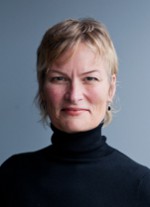
Pat Christen leads HopeLab by cultivating an environment of curiosity, candor, integrity, and play in which individuals are able to do their best work and are supported in living whole-heartedly. As President and CEO, she is responsible for oversight of HopeLab operations and the development of an organizational culture that delivers on HopeLab’s mission.
Pat has more than 25 years experience in the management of nonprofit organizations, including strategic planning, program development, business and fund development, board governance and leadership development. She is committed to finding practical and innovative solutions to complex problems. At HopeLab, she guides a multi-faceted team focused on developing effective solutions that will measurably improve the lives of young people with chronic illness.
Pat also served as president of the Pangaea Global AIDS Foundation, establishing AIDS clinics and playing an active role in AIDS-planning efforts globally. As president of Pangaea, she was responsible for the construction of the Infectious Diseases Institute at Makerere University in Kampala, Uganda, a state-of-the-art AIDS clinic, research, and training center which opened its doors in August of 2004. Pat has written, studied, and lectured on social and health issues both in the U.S. and abroad. She was a Peace Corps volunteer in Kenya, East Africa from 1982–1985. She is a member of the Young Presidents’ Organization and is a graduate of Stanford University, where she studied biology and political science.
Event organized by Wisdom 2.0
Conversations on Sociotechnical Systems: Challenges to Building a Mental Health System of Care in the US Army
Dr. Jayakanth "JK" Srinivasan
Wednesday, September 11, 2013 at 4:15PM
Dr. Jayakanth “JK” Srinivasan is a research scientist in Behavioral and Policy Sciences in the Sloan School of Management and the Sociotechnical Systems Research Center. As a member of the SSRC Post-Traumatic Stress Innovations project team, he leads the research on mental health system of care in the Army.
Sponsor(s): Sociotechnical Systems Research Center (SSRC)
SMT Leadership (India)
Think. Transform. Impact.
September 2-6, 2013
Venue: Bangalore, India
SMT Leadership Program aims to bridge the gap between theory and praxis for Tibetan monastic and science students by developing and implementing innovative solutions to address the immediate needs of the Tibetan diaspora community.
Participants will gain an understanding of ethics and values based leadership and entrepreneurship, while working in teams consisting of local community members and faculty and students from US universities. The strong service-learning component of this program requires that teams put their model projects into action, whether they are solar solutions to generate electricity and potable water or the creation of a science center to incubate future learning opportunities. Successful projects will have the ability to be scaled up to make greater impacts in the wider community.
(in partnership with Sager Family Foundation)
Compassionate Young Leaders
Energy Access, Ethics and Development
August 15-25, 2013
Venue: Abu Dhabi and India
The Dalai Lama Center for Ethics and Transformative Values at MIT and the Young Future Energy Leaders Program at the Masdar Institute of Science and Technology are jointly organizing a unique summer program that will train social entrepreneurs in starting and running small businesses to extend energy access and enhance sustainable development for rural communities. The course, “Compassionate Young Leaders Program on Energy Access, Ethics and Development”, will take place in August in both Abu Dhabi, United Arab Emirates and in the city of Leh, the capital of the state of Ladakh; a mountainous state of Northwestern India with plentiful natural resources, but limited electricity infrastructure.
The course will provide a hands-on introduction to sustainable development issues, off-grid energy technologies, and community-based business models, culminating in group projects that focus on expanding energy access for the local community. Half of the students will come from India, and half will start the course in the UAE and then travel to Leh. The cross-cultural exchange and opportunity for creating entrepreneurial teams with access to technical know-how, capital, and local knowledge will be a key outcome of the course. Trainers for the course will include experts from MIT and the Masdar Institute, as well as energy access practitioners with experience in starting small energy enterprises.
Transformative Leadership (Mexico)
a program on secular ethics and leadership for executives
August 1-3, 2013
Venue: Escuela Bancaria y Comercial, Mexico city, Mexico
Transformative Leadership (Mexico)
a program on secular ethics and leadership for executives
June 6-9, 2013
Venue: Escuela Bancaria y Comercial, Mexico city, Mexico
Transformative Leadership: A Talk by Tenzin Priyadarshi
Thursday, May 16, 2013 at 5:30PM
Venue: Rotman School of Management, University of Toronto
Sponsored by Leadership Experts Speaker Series @ Rotman
Roundtable on Cyber Ethics and Privacy
Mike Halsall
Thursday, April 4, 2013 at 7PM
Venue: Building 32, Room 144
Mike Halsall is Senior Network and Information Security Analyst at MIT, and currently sits on a number of steering committees for various Information Sharing and Analysis Centers. He has 18 years working in both corporate and academic environments, having held positions at IBM, AT&T, Bell Atlantic, Vermont Technical College and Middlebury College. As a fellow for The Center, he will be exploring various frameworks for making ethical decisions in the domain of computer security. Because one can’t discuss computer security without discussing privacy, privacy implications will be a dominant theme in the exploration of ethical decision making frameworks in the computer security field.
Living Personal and Professional Values
Friday, March 29, 2013
Venue: National Police Academy, Hyderabad, India.
Transformative Leadership
How to be an Extraordinary Leader & Build a Sustainable and Ethical Organization
Tenzin Priyadarshi
Monday, March 18, 2013
Venue: Jakarta, Indonesia
Organized by Entrepreneurs Organization (EO), Indonesia
Transformative Leadership
A Talk for the YPO & WPO Group
Tenzin Priyadarshi
Thursday, March 14, 2013
Venue: Jakarta, Indonesia
Davis Projects for Peace Application
Deadline February 4, 2013
Ethics as a Nexus Between Islam and the West
A Conversation with Pir Zia Inayat-Khan
Friday, November 30, 2012 at 7PM
Venue: Building 32, Room 123
Pir Zia Inayat-Khan is a scholar and teacher of Sufism in the lineage of his grandfather, Hazrat Inayat Khan. He received his B.A. (Hons) in Persian Literature from the London School of Oriental and African Studies, and his M.A. and Ph.D. in Religion from Duke University. Pir Zia is founder of Seven Pillars House of Wisdom, an interspiritual, interdisciplinary fellowship dedicated to the unfolding of wisdom in our time, and also of Sulūk Academy, a school of contemplative study with branches in the U.S. and Europe. His forthcoming publication, Saracen Chivalry: Counsels on Valor, Generosity and the Mystical Quest, will be published by Suluk Press, an imprint of Omega Publications, and is due November, 2012.
Whereas religious systems differ markedly in their theological views and ritual practices, the world’s religions and enlightened philosophical traditions find themselves in perfect accord on the essential importance of ethical integrity. At a time when the Islamic world and the West seem locked in an interminable symbolic conflict fraught with global peril, the ethical values that unite Islam and the West are a timely topic for exploration and celebration.
Becoming an Extraordinary Leader
Transforming Yourself to Transform Others
Deborah Ancona and Tenzin Priyadarshi
Thursday, October 25, 2012
Venue: E51 (MIT)
The WiSDM Symposium
Tuesday, October 23, 2012
The WiSDM Symposium, sponsored by the MIT Women in System Design and Management (
WiSDM), will be held on Tuesday October 23, 2012, as the afternoon session of the 2012 MIT SDM Conference on Systems Thinking for Contemporary Challenges.
WiSDM has invited accomplished female leaders across the industries of food and health, consumer products, and defense to discuss the application of systems thinking and systems engineering in their respective organizations.
Click here to register.AGENDA
11:45–12:30 pm: Lunch, MIT Faculty Club
12:30–1:15 pm: Luncheon Speaker
Zoe Finch Totten, Founder and CEO, The Full Yield; Ashoka Fellow
Reinstating Food in Healthcare Systems Design
1:15–1:45 pm: Break
1:45–2:30 pm: Heidi Grenek, Western Hemisphere Post Sale Supply Chain New Product Launch Manager, Xerox Corporation
Business Transformation and Optimization through System Dynamics and Systems Thinking
2:30–3:15 pm: Dr. Ellen Ferraro, Director of Systems Architecture, Design & Integration Directorate, Raytheon Integrated Defense Systems
The Art and Science of Systems Thinking and Systems Engineering
3:15–3:30 pm: Tina Srivastava, Deputy Technical Director, Electronic Warfare, Raytheon; SDM Fellow 2011
Key Themes—Creating Value through Systems Engineering
3:30–3:45 pm: Joan Rubin
Wrap-up
3:45–5:00 pm: Networking Reception Hosted by WiSDM
Co-sponsor(s):



Systems Thinking for Contemporary Challenges
Addressing Complexity and Innovation in Energy, Big Data and Diverse Industries
Monday, October 22-23, 2012
Venue: Wong Auditorium
Across industries and government organizations around the globe, a systems-based approach is increasingly seen as critical to addressing the urgent and complex problems we face today. For many organizations, the question is not whether to employ systems thinking, but how to apply it to maintain competitive advantage.
The Massachusetts Institute of Technology’s annual Conference on Systems Thinking for Contemporary Challenges, sponsored by the System Design and Management Program, will focus on addressing complexity and innovation in energy and managing complex data across industries. MIT has carefully chosen speakers not only for their expertise in addressing complex systems challenges, but also for their role in leading the implementation of the day-to-day tasks that produce results.
MIT professors will frame the three-fold nature of systems thinking—technical, managerial, and socio-political—and outline how it is being applied in these critical areas. Industry leaders will describe best practices that demonstrate the challenges they face within and outside of their organizations, how they apply a systems-based approach, the benefits achieved, and the lessons learned.
The aim of the conference is to provide practical information from multiple disciplines that will spark ideas for how to implement systems thinking and innovation to address complex challenges, whether in industry, academia, government, or the world at large.
Click here to register.Co-sponsor(s):


GLOBAL SYSTEMS 2.0
Ethics, Economy, & Environment | Peace, Governance, & Diminishing Resources
His Holiness the Dalai Lama et al
Monday, October 15, 2012
Venue: Massachusetts Institute of Technology
Beyond Religion: Ethics, Values, & Wellbeing
A Talk by His Holiness the Dalai Lama
Sunday, October 14, 2012 at 1PM
Venue: Grand Ballroom, Marriott Copley Boston

Tenzin Gyatso, the XIVth Dalai Lama, is a moral figure and spiritual leader revered worldwide. He was born to a farming family on July 6, 1935 in a small village called Taktser in northeastern Tibet. He was recognized, in accordance with Tibetan tradition, at the age of two as the reincarnation of his predecessor, the XIIIth Dalai Lama. The Dalai Lamas are believed to be Embodiments of Compassion, who choose to reincarnate for the purpose of serving humanity. Winner of the Nobel Prize for Peace in 1989, he is universally respected as a spokesman for the compassionate and peaceful resolution of human conflict. Most recently he was awarded the United States Congressional Gold Medal in 2007 in recognition for his “many enduring and outstanding contributions to peace, non-violence, human rights and religious understanding.” He has traveled extensively, speaking on subjects including universal responsibility, love, compassion and kindness.His Holiness is committed to the promotion of the human values of compassion, forgiveness, tolerance, contentment and self-discipline – what he calls secular ethics – and also promotes religious harmony and understanding among the world’s major religious traditions.
Through Gratefulness: A 21st Century Vision of a Transformed World
Brother David Steindl-Rast | Introduced by The Reverend Kim K. Crawford Harvie
October 13, 2012 at 3PM
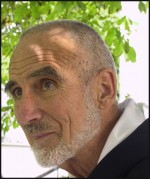
Brother David Steindl-Rast, O.S.B. was born in 1926 in Vienna, Austria. He studied art, anthropology, and psychology, receiving a Ph.D. from the University of Vienna. Since 1953 he has been a monk of Mount Saviour Benedictine monastery in New York. He was one of the first Roman Catholics to participate in Buddhist-Christian dialogue.
For decades, Brother David has divided his time between periods of a hermit’s life and extensive lecture tours. His audiences included starving students in Zaire and faculty at Harvard and Columbia, Buddhist monks and Sufi retreatants, New Age commune residents and naval cadets, Green Berets and international peace conference participants.
He has contributed to books and periodicals from the
Encyclopedia Americana to the
New Age Journal. He authored
Gratefulness, the Heart of Prayer and
A Listening Heart, both reprinted and anthologized for more than two decades. Brother David co-authored
Belonging to the Universe, with physicist, Fritjof Capra, and
The Ground We Share on Buddhist and Christian practice with Robert Aitken Roshi. His most recent book is
Deeper Than Words: Living the Apostles’ Creed.
Brother David co-founded
www.gratefulness.org, a website supporting ANG*L (A Network for Grateful Living). It reaches more than 8,000 visitors daily, from over 200 countries.
The Reverend Ms. Kim K. Crawford Harvie was raised in Concord, Massachusetts and graduated with honors from Middlebury College (Vermont) and Harvard Divinity School. Ordained into the Unitarian Universalist ministry in 1984, she served congregations on Cape Cod, most notably in Provincetown at the height of the AIDS crisis. In 1989, she was called to Arlington Street Church in Boston, “gathered in love and service for justice and peace,” where she continues to serve as Senior Minister.
Search Inside Yourself
Meng-Chade Tan, Jolly Good Fellow of Google | Introduced by Muriel Medard
October 12, 2012 at 7PM
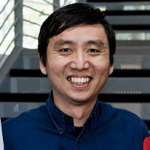
Chade-Meng Tan (Meng) is a Google pioneer, an award-winning engineer, a New York Times bestselling author, a thought leader, and a philanthropist. He is also quite funny.
Meng is Google’s Jolly Good Fellow (which nobody can deny). Like many things in Google, his unusual job title started as a joke, but eventually became real. Meng was one of Google’s earliest engineers. Among many other things, he helped build Google’s first mobile search service, and headed the team that kept a vigilant eye on Google’s search quality. After a successful 8-year stint in Engineering and 2 years as GoogleEDU’s Head of Personal Growth, he now serves with Google’s Talent Team. His current job description is, “Enlighten minds, open hearts, create world peace”.
One of Meng’s main projects at Google is a groundbreaking mindfulness-based emotional intelligence course called Search Inside Yourself, which was featured on the front page of the Sunday Business section of the New York Times. Search Inside Yourself is also the title of Meng’s New York Times bestselling book which has been endorsed by world leaders such as President Carter of the United States and President Nathan of Singapore, business leaders such as Eric Schmidt of Google and John Mackey of Whole Foods Markets, and spiritual leaders such as the Dalai Lama and Deepak Chopra. Meng hopes Search Inside Yourself will eventually contribute to world peace in a meaningful way.
Outside of Google, Meng is the Founder and (Jolly Good) President of the Tan Teo Charitable Foundation, a small foundation dedicated to promoting Peace, Liberty and Enlightenment in the world. He is a Founder and the Chairman of the Search Inside Yourself Leadership Institute (SIYLI). He is a Founding Patron of Stanford University’s Center for Compassion and Altruism Research and Education (CCARE). He is also a Founding Patron of the World Peace Festival, and adviser to a number of technology start-ups.
Meng earned his MS in Computer Science from the University of California at Santa Barbara. He went to Santa Barbara mainly for the beach, but didn’t mind the graduate degree either. He has won many computing-related awards, including the Championship of Singapore’s National Software Competition. Prior to coming to the United States, Meng had a successful engineering career in Singapore. (He knew it was successful because nobody offered to fire him).
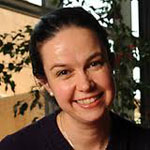
Muriel Médard is a Professor in the Electrical Engineering and Computer Science at MIT. She was previously an Assistant Professor in the Electrical and Computer Engineering Department and a member of the Coordinated Science Laboratory at the University of Illinois Urbana-Champaign. From 1995 to 1998, she was a Staff Member at MIT Lincoln Laboratory in the Optical Communications and the Advanced Networking Groups. Professor Médard received B.S. degrees in EECS and in Mathematics in 1989, a B.S. degree in Humanities in 1990, a M.S. degree in EE 1991, and a Sc D. degree in EE in 1995, all from the Massachusetts Institute of Technology (MIT), Cambridge. She has served as an Associate Editor for the Optical Communications and Networking Series of the IEEE Journal on Selected Areas in Communications, as an Associate Editor in Communications for the IEEE Transactions on Information Theory and as an Associate Editor for the OSA Journal of Optical Networking. She has served as a Guest Editor for the IEEE Journal of Lightwave Technology, the Joint special issue of the IEEE Transactions on Information Theory and the IEEE/ACM Transactions on Networking on Networking and Information Theory and the IEEE Transactions on Information Forensic and Security: Special Issue on Statistical Methods for Network Security and Forensics. She serves as an associate editor for the IEEE/OSA Journal of Lightwave Technology. She is a member of the Board of Governors of the IEEE Information Theory Society.
Teaching How to Fish: Solving Problems versus Nurturing People in Global Development
Kentaro Toyama, Manish Bharadwaj et al
October 11, 2012 at 7PM
![toyama[1]](http://thecenter.mit.edu/wp-content/uploads/2012/05/toyama1-150x150.jpg)
Kentaro ToyamaKentaro Toyama (
www.kentarotoyama.org) is a researcher in the School of Information at the University of California, Berkeley. He is working on a book that argues that the intrinsic growth of people and institutions should be the primary focus of global development. Previously, Toyama co-founded Microsoft Research India, where he started an interdisciplinary research group to understand how electronic technology could support the socio-economic development of the world’s impoverished communities. The group’s projects – including Digital Green, MultiPoint, and Text-Free UI – have been seminal in ICT4D research, even as Toyama has gone on to be a vocal critic of techno-utopian hype in development. Prior to his time in India, he did computer vision research at Microsoft Research in Redmond, WA, USA and Cambridge, UK, and taught mathematics at Ashesi University in Accra, Ghana. Toyama graduated from Yale with a PhD in Computer Science and from Harvard with a bachelors degree in Physics.
Manish Bhardwaj is the CEO and co-founder of Innovators In Health (IIH), a non-profit committed to ensuring that the rural poor suffering from
tuberculosis (TB) get care that matches the best in the world. As of early 2012, IIH provided access to care to a catchment of 85,000 residents in rural Bihar, India.
Prior to IIH, Manish was a co-founder and Vice President at Engim Inc., a private venture backed wireless semiconductor startup. Manish has won several awards including the IBM Research Fellowship, the MIT Graduate Student Council teaching award, and the Compaq Gold Medal. He has Ph.D. and S.M. degrees in Electrical Engineering and Computer Science from the Massachusetts Institute of Technology, and a Bachelor of Applied Science from the Nanyang Technological University,
Singapore. A native of India, he has lived in Singapore, Indonesia, Austria and the U.S.
Compassionate Young Leaders
(A program for high school students)
July 2-18, 2012
Venue: Leh, India
How Can We Feed a Growing World and Sustain the Planet?
Speaker: Professor Jonathan Foley
Director, Institute on the Environment (IonE), University of Minnesota
Board of Advisors, The Dalai Lama Center for Ethics at MIT
Tuesday, May 1, 2012 at 4:30PM
Venue: E51-115, Reception following in Building 54, Room 923.
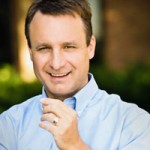
Jonathan Foley is the director of the Institute on the Environment (IonE) at the University of the Minnesota, where he is a professor and McKnight Presidential Chair in the Department of Ecology, Evolution and Behavior. He also leads the IonE’s
Global Landscapes Initiative. Foley’s work focuses on the sustainability of our civilization and the global environment. He and his students have contributed to our understanding of global food security, global patterns of land use, the behavior of the planet’s climate, ecosystems and water cycle, and the sustainability of the biosphere. This work has led him to be a regular advisor to large corporations, NGOs and governments around the world. Foley joined the University of Minnesota in 2008, after spending 15 years on the faculty of the University of Wisconsin, where he founded the Center for Sustainability and the Global Environment. He and his colleagues have published numerous articles in the scientific literature, including highly cited work in Science, Nature and the Proceedings of the National Academy of Sciences. He has also written many popular articles and essays, including pieces in the New York Times, Scientific American, SEED, E360, the Guardian, Momentum, and elsewhere. His public presentations on global issues have been featured at hundreds of venues, including the Aspen Environmental Forum, the Quatauqua Institution, and TED. Foley has won numerous awards and honors, including the National Science Foundation’s Faculty Early Career Development Award; the J.S. McDonnell Foundation’s 21st Century Science Award; an Aldo Leopold Leadership Fellowship; and the Sustainability Science Award from the Ecological Society of America. In 1997, President Bill Clinton awarded him the Presidential Early Career Award for Scientists and Engineers.
Co-Sponsor(s): Center for Global Change Science, Civil and Environmental Engineering, Earth, Atmospheric, and Planetary Sciences (EAPS)
Womens Right’s in Iran and the Islamic World
Speaker: Dr. Shirin Ebadi, 2003 Nobel Peace Prize Winner
Wednesday, April 4, 2012 at 4-5 PM
Venue: MIT- Wong Auditorium (E51-115)
![shirin_ebadi[1]](http://thecenter.mit.edu/wp-content/uploads/2012/05/shirin_ebadi1-150x113.jpg)
Shirin Ebadi is a lawyer, human rights activist, and the recipient of the 2003 Nobel Peace Prize for her work defending the rights of women and children in Iran, and advocating an interpretation of Islam which is compatible with democracy and human rights. She is the first Iranian and Muslim woman to receive the prize. Ebadi received a law degree from the University of Tehran in 1965, and became one of the first female judges in Iran.
In 1975, she was the first Iranian woman to preside over a legislative court. Following Iran’s Islamic Revolution in 1979, Ebadi was demoted to the position of a clerk in the court she had presided over because the revolution deemed women unfit to serve as judges. Unable to accept the discrimination against her, she resigned, and although her application was repeatedly rejected, finally obtained a license to open a law firm. For the next two decades, Ebadi devoted her life to the promotion of women’s rights, the defense of children, and political activists. Her organization, the Association for Human Rights Advocates, provides pro bono legal service to political prisoners in Iran. Shirin Ebadi has spoken out strongly against discrimination and injustice in her country, at times despite great risk to her own safety.
In 2000, she spent a month in solitary confinement as a result of defending the family of a student killed by the police in protests in Tehran. Shirin Ebadi’s principal arena is the struggle for basic human rights and the fundamental value that political power in a community must be built on democratic elections. She favors dialogue as the best path to changing attitudes and resolving conflict, and as a conscious Muslim believes there is no conflict between Islam and fundamental human rights.
Dr. Ebadi is the founder of three NGOs in Iran, The Association for the Defense of the Rights of the Child, The Association for Human Rights Advocates, and the Organization against Mines in Iran. She is the author of 14 books, including available in English a memoir Iran Awakening; Refugee Law in Iran; and, The Golden Cage.
Will Technology Save the World?
Speakers: Rosalind Picard, Jose Gomez-Marquez, Susan Silbey,
George Barbastathis, Ian HutchinsonModerated by Dr. Ian Hutchinson
Date: March 9, 2012 at 6:00p-8:00p
Venue: W-16, Kresge Auditorium, MIT
Rosalind Picard
Founder and Director of the Affective Computing Research Group, MIT Media Laboratory
Rosalind W. Picard is founder and director of the Affective Computing Research Group at the MIT Media Laboratory and co-director of the Things That Think Consortium, the largest industrial sponsorship organization at the lab. The author of over a hundred peer-reviewed scientific articles in multidimensional signal modeling, computer vision, pattern recognition, machine learning, and human-computer interaction, Picard is known internationally for pioneering research in affective computing and, prior to that, research in content-based image and video retrieval. She is a graduate with honors from the Georgia Institute of Technology and holds Masters and Doctorate degrees in Electrical Engineering and Computer Science from MIT.
![barbasthasis[1]](http://thecenter.mit.edu/wp-content/uploads/2012/03/barbasthasis1.jpg)
George Barbasthasis
Singapore Research Professor of Optics and Professor of Mechanical Engineering, MIT
Dr. George Barbastathis is Professor of Mechanical Engineering at MIT and Faculty Resident with the Singapore-MIT Alliance for Research and Technology (SMART) Centre. He received the Diploma in Electrical and Computer Engineering from the National Technical University of Athens in 1993, and the M.Sc. and Ph.D. in Electrical Engineering from Caltech in 1994 and ’97, respectively. Between 1997-99 he was a Post-doctoral Research Associate with the Beckman Institute at the University of Illinois, Urbana-Champaign. Between 2006-2007 he was Visiting Scholar with the School of Engineering and Applied Science at Harvard University. He has been the recipient of the Nikolaos Kritikos award in Mathematics, the 3M Innovation Award, the NSF Young Investigator Award, and the Esther & Harold E. Edgerton junior chair at MIT. He and his team at the SMART center developed an “invisibility cloak†using a very simple and inexpensive system. This method of using Science to hide objects in plain sight was voted in the top 10 breakthroughs in Physics in 2010.
![gomez-marquez[1]](http://thecenter.mit.edu/wp-content/uploads/2012/03/gomez-marquez1.jpg)
Jose Gomez-Marquez
Program Director, Innovations in International Health Initiative, MIT
Jose Gomez-Marquez is the program director for the Innovations in International Health initiative at MIT. He leads a team of multidisciplinary team of scientists to design medical devices for developing countries. He is co-inventor of the Aerovax Drug Delivery System, a device for mass delivery of inhalable drugs and vaccines to remote populations and the X out TB program, which aims to increase TB therapy adherence in developing countries using novel diagnostics and mobile technology. Recently, the group has developed the MEDIKit, a series of design building blocks that empower doctors and nurses in developing countries to invent their medical technologies.
Jose serves on the European Union’s Science Against Poverty Taskforce and has participated as an expert advisor in the President’s Council of Advisors on Science and Technology. He is an instructor of MIT’s D-Lab: Health, a course on designing global health technologies at MIT. Jose is a 3 time MIT IDEAS Competition winner, including two Lemelson Awards for International Technology. In 2009, Jose was selected to Technology Review’s T35, which also named him Humanitarian of the Year. In 2011 he was named a TED Fellow. Born and raised in Honduras he currently lives in Cambridge, Massachusetts.
![sibley[1]](http://thecenter.mit.edu/wp-content/uploads/2012/03/sibley1.jpg)
Susan S. Sibley
Leon and Anne Goldberg Professor of Humanities, and Professor of Sociology and Anthropology, MIT
Professor Silbey is Leon and Anne Goldberg Professor of Humanities, and Professor of Sociology and Anthropology. Professor Silbey is the recipient of numerous prizes and awards including John Simon Guggenheim Foundation Fellowships (2009), the Harry Kalven Jr. Prize for advancing the sociology of law (2009), Doctor Honoris Causa from Ecole Normale Superiere Cachan, in Paris (2006). She is also Past President of the Law & Society Association, and a fellow of the American Academy of Political and Social Science.
Silbey received her Ph.D. in Political Science from the University of Chicago and post-graduate training in ethnography in the Sociology Department of Brandeis University. She has written about the social organization of law in diverse institutional and informal settings including attorney general’s offices, courts, schools, private homes, businesses and scientific laboratories; she has also studied alternative forms of dispute resolution including negotiation and mediation. She has edited Studies in Law, Politics and Society (1990-1997) and the Law & Society Review (1998-2000). In 1998, she published The Common Place of Law: Stories from Everyday Life (with Patricia Ewick) describing the ways in which Americans imagine, use, and construct the rule of law, in 2003, In Litigation: Do the ‘Haves’ Still Come Out Ahead? (edited with Herbert Kritzer), and in 2008 Law and Science I, Epistemological, Evidentiary, and Relational Engagements, and Law and Science II, Regulation of Property, Practices, and Products.
Silbey’s current research looks at the roles and conceptions of law in scientific laboratories, comparing the place of law in expert communities and popular culture, with special attention to the ways in which complex technological organizations observe and govern themselves. She is supervising an experiment in ethnographic fieldwork on the development of new safety regimes in research labs. In addition, she is completing a six year longitudinal study of engineering education, following a cohort of students through four different engineering schools.
“However far modern science and technics have fallen short of their inherent possibilities, they have taught mankind at least one lesson: Nothing is impossible.”
Lewis Mumford, Technics and Civilization, 1934. (Columbia)
“Why does this magnificent applied science which saves work and makes life easier bring us so little happiness? The simple answer runs: Because we have not yet learned to make sensible use of it.”
Albert Einstein, in an address at Caltech, 1931. (Harper)
“Technology shapes society and society shapes technology.”
Robert S. White, Environmental Science and Technology, 1990. (S&S)
Of Heat-Seeking, Robotic Fishing Poles (or, Myths of Technology for International Development)
Speaker: Kentaro Toyama
Thursday, March 01, 2012 at 7PM
Venue: 35-225
![toyama[3]](http://thecenter.mit.edu/wp-content/uploads/2012/05/toyama3-150x150.jpg)
Can mobile phones be used to improve rural healthcare?
How do you design user interfaces for an illiterate migrant worker?
What value is video technology to a farmer earning $1 a day?
Interventionist projects in “information and communication technology for development” (ICT4D) seek to answer these kinds of questions, but the excitement has also generated excessive hype about the power of technology to solve the deep problems of poverty. In this talk, I will present several persistent myths of ICT4D, offer a theory of “technology as amplifier” which explains the gap between rhetoric and reality, and provide recommendations for engineers and scientists interested in contributing to a better world. My hope is to suggest that while technology might not save the world, technologists have much to contribute.
Kentaro Toyama is a researcher in the School of Information at the University of California, Berkeley. He is working on a book that argues that the intrinsic growth of people and institutions should be the primary focus of global development. Previously, Toyama co-founded Microsoft Research India, where he started an interdisciplinary research group to understand how electronic technology could support the socio-economic development of the world’s impoverished communities.
Compassionate Young Leaders
(A program for high school students)By invitation only. Enrollment Closed.
February 18-19, 2012
Venue: Sun Valley, ID
2011 MIT SDM Conference on Systems Thinking for Contemporary Challenges
Addressing Complexity and Innovation in Healthcare, Education, and Product Development
October 24-25, 2011
Venue: Massachusetts Institute of TechnologyWong Auditorium
Across industries and government organizations around the globe, a systems-based approach is increasingly seen as critical to addressing the urgent and complex problems we face today. For many organizations, the question is not whether to employ systems thinking, but how to apply it before it is too late.
The Massachusetts Institute of Technology’s annual Conference on Systems Thinking for Contemporary Challenges, sponsored by the System Design and Management Program, will focus on addressing complexity and innovation in healthcare, education, and product development. MIT has carefully chosen speakers not only for their expertise in addressing complex systems challenges, but also for their role in leading the implementation of the day-to-day tasks that produce results.
MIT professors will frame the three-fold nature of systems thinking—technical, managerial, and socio-political—and outline how it is being applied in these critical areas. Industry leaders will describe best practices that demonstrate the challenges they face within and outside of their organizations, how they apply a systems-based approach, the benefits achieved, and the lessons learned.
The aim of the conference is to provide practical information from multiple disciplines that will spark ideas for how to implement systems thinking and innovation to address complex challenges, whether in industry, academia, government, or the world at large.
There will be ample time for Q&A with speakers and networking with executives attending the conference.
Confirmed speakers include:
Keynotes- Edward Crawley, PhD, Ford Professor of Engineering, Professor of Aeronautics and Astronautics and of Engineering Systems; Codirector, Bernard M. Gordon–MIT Engineering Leadership Program; Cofounder SDM
- Julian Goldman, MD, Medical Director of Biomedical Engineering for Partners HealthCare System; Principal Anesthesiologist, Massachusetts General Hospital “Operating Room of the Future”; Director of the Program on Medical Device Interoperability at MGH and the Center for Integration of Medicine and Innovative Technology (CIMIT)
- Thomas L. Magnanti, Institute Professor; Dean of the School of Engineering 1999–2006; Professor of Management Science and Electrical Engineering President, Singapore University of Technology and Design; Cofounder, SDM
From MIT
- Steven Eppinger, ScD, General Motors Leaders for Global Operations Professor of Management; Professor of Management Science and Engineering Systems; Codirector, System Design and Management Program
- Pat Hale, Director, MIT System Design and Management Fellows Program; Senior Lecturer, MIT Engineering Systems Division
- David Hartzband, ScD, Lecturer, Engineering Systems Division, MIT
- Sahar Hashmi, MD, SDM alumna and current MIT Engineering Systems Division (ESD) PhD candidate
- Richard C. Larson, PhD, Mitsui Professor of Engineering Systems and Civil and Environmental Engineering; Director, Center for Engineering Systems Fundamentals
- Joan S. Rubin, SDM Industry Codirector
- Warren Seering, Weber-Shaughness Professor of Mechanical Engineering and Engineering Systems; Codirector, MIT
From Industry
- Malvern Atherton, Chief Design Engineer, Control Systems, Rolls-Royce Corporation, SDM alumnus
- Devon C. Campbell, Head (Director) of Engineering and Systems, Novartis Molecular Diagnostics (MDx)
- Katharine Frase, PhD, Vice President, Industry Solutions and Emerging Business, IBM Research
- Doug Hague, PhD, Small Business Analytics Executive, Consumer and Small Business Banking, Bank of America, SDM alumnus
- John Helferich, former Senior Vice President of R&D, Mars Inc.; ESD PhD student; SDM alumnus
- Michael C. Little, PhD, Global Head of Diagnostics Development, Novartis Molecular Diagnostics (MDx)
- Thomas Pelland, Vice President and General Manager, Air Management Systems, Hamilton Sundstrand, SDM alumnus
- Irving Wladawsky-Berger, PhD, Chairman Emeritus, IBM Academy of Technology, and MIT Visiting Lecturer of Engineering Systems
Co-sponsored by:
![mitsdm[1]](http://thecenter.mit.edu/wp-content/uploads/2012/05/mitsdm1.png)
![logo_mit-sloan[1]](http://thecenter.mit.edu/wp-content/uploads/2012/05/logo_mit-sloan1.jpg)
![esd[1]](http://thecenter.mit.edu/wp-content/uploads/2012/05/esd1.gif)
![regional_home[1]](http://thecenter.mit.edu/wp-content/uploads/2012/05/regional_home1.jpg)
![index[1]](http://thecenter.mit.edu/wp-content/uploads/2012/05/index1.jpg)
![MITRE[1]](http://thecenter.mit.edu/wp-content/uploads/2012/05/MITRE1.jpg)
![ilww[1]](http://thecenter.mit.edu/wp-content/uploads/2012/05/ilww1.jpg)
![mit-systhink-2011[1]](http://thecenter.mit.edu/wp-content/uploads/2012/05/mit-systhink-20111.jpg)


MIT 150 Years Events
January 27-June 7, 2011
New Ark Peace Education Summit: The Power of Non-violence
with His Holiness the Dalai Lama, Shrin Ebadi, & Jodi Williams
May 13-15, 2011
![hhdl[1]](http://thecenter.mit.edu/wp-content/uploads/2012/05/hhdl1.jpg)
![se[1]](http://thecenter.mit.edu/wp-content/uploads/2012/05/se1.jpg)
![jw[1]](http://thecenter.mit.edu/wp-content/uploads/2012/05/jw1.jpg)
The Center will be a co-sponsor of the Newark Peace Education Summit, a three day conference focusing on peacemaking practices from around the world. It features panels and workshops with His Holiness the XIVth Dalai Lama, Newark Mayor Cory Booker, Somaly Mam, Nobel Laureates and peace advocates from a wide cross section of cultures, disciplines and perspectives. The summit will explore the programs, policies, and methods used by communities to establish peace, why and how they work, and how to replicate them in America and around the world. The event will be held at the NJPAC (New Jersey Performing Arts Center) in Newark, New Jersey, May 13-15, 2011. Do not miss this precious opportunity to cultivate peace.
Secular Ethics, Human Values, and Society
with His Holiness the Dalai Lama
Tuesday, May 3, 2011
The Center in partnership with the Dalai Lama Foundation and University of Southern California is pleased to announce a multi-disciplinary meeting on “Secular Ethics, Human Values, and Society” with His Holiness the Dalai Lama on Tuesday, May 3rd, 2011. Visit the USC web site for more information and registration
: http://dalailama.usc.edu/Transformative Leadership
March 24-30, 2011
Venue: CUTS, India
Professor Erica Dawson, Yale School of Management
Professor Rodrigo Canales, Yale School of Management
Tenzin Priyadarshi, The Dalai Lama Center for Ethics and Transformative Values
December 2010 Programs in Mexico
VIERNES 3
11:00 CONFERENCIA EN UNIVERSIDAD IBEROAMERICANA,
TEMA: TRANSFORMÁNDOSE UNO MISMO PARA TRANSFORMAR A LOS DEMÁS
LUNES 6
10:00 CONFERENCIA EN EL TECNOLOGICO DE MONTERREY
TEMA: TRANSFORMANDOSE A UNO MISMO PARA TRANSFORMAR A LOS DEMAS
13:00 CONFERENCIA EN LA UNIVERSIDAD DEL CLAUSTRO DE SOR JUANA
TEMA: TRANSFORMANDOSE A UNO MISMO PARA TRANSFORMAR A LOS DEMAS
18:00 UNIVERSIDAD TECNOLOGICA DE MEXICO (UNITEC), CAMPUS MARINA
TEMA: TRANSFORMANDOSE A UNO MISMO PARA TRANSFORMAR A OTROS
MARTES 7
11:00 UNIVERSIDAD TECNOLOGICA DE MEXICO (UNITEC), CAMPUS IZTAPALAPA
TEMA: TRANSFORMANDOSE A UNO MISMO PARA TRANSFORMAR A OTRODS
19:00 ESCUELA BANCARIA COMERCIAL, PLANTEL REFORMA
TEMA: LIDERAZGO ILUMINADO
Enlightened Leadership: A Conversation with the Venerable Tenzin Priyadarshi
Wednesday, November 10th from 4:00 to 5:00PM
Venue: Steinbach Lounge at the Yale School of Management (52 Hillhouse Avenue)
Co-sponsored by Yale SOM and The Human Capital Club
Integrity and Inner Transformation
A Talk by Don Morrison, Chief Operating Officer of Research In Motion (RIM- Blackberry)
Introduced by Professor Murial Medard
Thursday, November 4, 2010 at 7PM
Don Morrison is the Chief Operating Officer of Research In Motion. Don oversees all domestic and international operations focusing on the development and execution of a world-class, customer-driven organization to support the BlackBerry wireless solution. Before joining RIM in 2000, Don undertook a number of senior leadership positions in Canada, the United States, Europe and the Middle East with AT&T and Bell Canada. Don is the founder of the Golden Thread Charitable Foundation and the Morrison Centre for Peace and Conflict Research. He is on the board of HealthyKids International and is a member of the Strategic Planning Committee for SickKids Hospital Foundation. Don holds an MBA and BA from the University of Toronto and also participated in the Executive Program at the University of Virginia, Darden Business School.
![medard[1]](http://thecenter.mit.edu/wp-content/uploads/2012/05/medard1.jpg)
Muriel Médard is a Professor in the Electrical Engineering and Computer Science at MIT. She was previously an Assistant Professor in the Electrical and Computer Engineering Department and a member of the Coordinated Science Laboratory at the University of Illinois Urbana-Champaign. From 1995 to 1998, she was a Staff Member at MIT Lincoln Laboratory in the Optical Communications and the Advanced Networking Groups. Professor Médard received B.S. degrees in EECS and in Mathematics in 1989, a B.S. degree in Humanities in 1990, a M.S. degree in EE 1991, and a Sc D. degree in EE in 1995, all from the Massachusetts Institute of Technology (MIT), Cambridge. She has served as an Associate Editor for the Optical Communications and Networking Series of the IEEE Journal on Selected Areas in Communications, as an Associate Editor in Communications for the IEEE Transactions on Information Theory and as an Associate Editor for the OSA Journal of Optical Networking. She has served as a Guest Editor for the IEEE Journal of Lightwave Technology, the Joint special issue of the IEEE Transactions on Information Theory and the IEEE/ACM Transactions on Networking on Networking and Information Theory and the IEEE Transactions on Information Forensic and Security: Special Issue on Statistical Methods for Network Security and Forensics. She serves as an associate editor for the IEEE/OSA Journal of Lightwave Technology. She is a member of the Board of Governors of the IEEE Information Theory Society.
Co-sponsored by MIT Leadership Center
Made for Goodness
A Talk by Mpho Tutu
Introduced by Philip F. Mangano,
President and CEO The American Round Table to Abolish Homelessness
Former Executive Director, United States Interagency Council on Homelessness
Saturday, October 23, 2010 at 4PM
The Reverend Mpho A. Tutu, an Episcopal priest, is the founder and Executive Director of the Tutu Institute for Prayer & Pilgrimage.
Ms. Tutu has run ministries for children in the downtown Worcester, Massachusetts; for rape survivors in Grahamstown, SA; and for refugees from South Africa and Namibia at the Phelps Stokes Fund in New York City. She earned her MDiv from Episcopal Divinity School in Cambridge, Massachusetts and began her ordained ministry at Historic Christ Church in Alexandria, Virginia.
Ms. Tutu is an experienced preacher, teacher, and retreat facilitator. With her father, Archbishop Emeritus Desmond Tutu, she has authored the recently published book, “Made for Goodness”.
The Reverend Mpho Tutu is the Chairperson Emeritus of the board of the Global AIDS Alliance, the Chairperson of the Board of Advisors of the 911 Unity Walk, and a trustee of Angola University.
Ms Tutu is married to Joseph Burris; they have two daughters, Nyaniso and Onalenna.
![mangano2[1]](http://thecenter.mit.edu/wp-content/uploads/2012/05/mangano21.jpg)
Philip F. Mangano is President and CEO of The American Round Table to Abolish Homelessness, whose mission is to be a strategic partner with every level of government and every element of the private and faith-based sectors to prevent and end the long misery of homelessness for our poorest neighbors. Internationally recognized for his bold leadership on an issue seen as intractable, Mr. Mangano’s unique blend of business experience, public service, and personal commitment energize partners to focus on solutions. The Round Table is committed to strategies that are research and data driven, performance-based, consumer-centric, and results-oriented and to rapid dissemination of innovation, information, and inspiration to its partners. For the past seven years, Mr. Mangano led the national strategy to prevent and end homelessness in his position as the Executive Director of the United States Interagency Council on Homelessness. Mr. Mangano was appointed as the Council’s Executive Director in 2002, serving under both President George Bush and in the first 100 days of the Obama Administration. Mangano’s successful results-oriented strategies and innovative initiatives focused the Council’s mission to coordinate the Federal response to homelessness and to create partnership throughout government and the private sector to end homelessness. His new strategies resulted in an unprecedented national partnership of 20 Federal agencies, 53 Governors, and over 1,000 Mayors and County Executives partnered in over 350 local jurisdictional Ten Year Plans. With his leadership, new interagency and community collaborations have been established across the country. The prioritization by the Council on the prevention of homelessness and rapid re-housing of homeless people focused Federal policy and encouraged local plans and investments from the public and private sectors.
Reconciling Peace-Making: A Transformative Ethic
A Talk by Robert Taylor
Thursday, October 21, 2010 at 7PM
![taylor[1]](http://thecenter.mit.edu/wp-content/uploads/2012/05/taylor1.jpg)
Robert V. Taylor is Chair of the Desmond Tutu Peace Foundation in New York. Born and raised in South Africa, Robert saw firsthand the potential for peace making when oppressed people find the courage to be who they are through discovering their voices and trusting their imagination. In 1980 his mentor, Archbishop Desmond Tutu sent Robert to the United States to avoid imprisonment for his anti-apartheid activity. A graduate of Rhodes University in South and Union Theological Seminary in New York he eventually became the highest ranking openly gay clergy person in the Episcopal Church at the time. He lectures nationally on compassion, peace-making and reconciliation engaging audience across the United States in realizing their full human potential and impact in the world.
His lecture will address the way in which reconciling peacemaking is a grounding transformative ethic in our personal lives and in society reorienting how we perceive ourselves and others. He will explore the ways in which technology and social media offer ground breaking opportunities for creating a new normalcy to local and global peace-making and reconciliation, and how this expands our understanding of the inter-connectedness of all people with implications for reframing the landscape of power dynamics among diverse peoples. He will draw on his own involvement in creating an open source peace platform with its potential for a transformative ethic of human engagement.
Co-sponosored by Technology and Culture Forum at MIT
Becoming an Extraordinary Leader:
Transforming Yourself to Transform Others
Instructors: Professor Rodrigo Canales and The Venerable Tenzin Priyadarshi
October 18 & 19, 2010
Venue: Sloan School of Management
Comeback America: Turning the Country Around and Restoring Fiscal Responsibility
A Talk by The Honorable David M. Walker, President and CEO of the Peter G. Peterson
Foundation and Former Comptroller General of the United States
Wednesday, October 6, 2010 at 7PM
Venue: MIT Building E51, Room 325
![davidmwalker[1]](http://thecenter.mit.edu/wp-content/uploads/2012/05/davidmwalker1.jpg)
Dave M. Walker is President and CEO of the Peter G. Peterson Foundation. In this capacity he leads the Foundation’s efforts to promote federal financial responsibility and accountability today in order to create more opportunity tomorrow.
Prior to assuming his position with the Foundation in March of 2008, Dave served as the seventh Comptroller General of the United States and head of the U.S. Government Accountability Office (GAO) for almost ten years. This was one of Dave’s three presidential appointments each by different Presidents from both major political parties during his 15 years of total federal service.
Dave also has over 20 years of private sector experience, including approximately 10 years as a Partner and Global Managing Director of Human Capital Services for Arthur Andersen LLP. During this period, he also served as one of the two Public Trustees for Social Security and Medicare.
In addition to his leadership responsibilities at the Foundation, Dave serves on various boards and advisory groups, including as Chairman of the United Nations Independent Audit Advisory Committee, as a member of The Public Company Accounting Oversight Board’s Advisory Committee, and as a member of the Trilateral Commission. Dave has authored three books. The most recent, Comeback America, shows how we can return to our nation’s founding principles, and outlines a number of sensible solutions to get America back on track. He is a frequent writer and commentator, and is a subject of the critically acclaimed documentary I.O.U.S.A.
![phillipclay[1]](http://thecenter.mit.edu/wp-content/uploads/2012/05/phillipclay1.jpg)
Phillip L. Clay is the MIT chancellor and professor of city planning. As chancellor, he is one of the Institute’s two most senior academic officers, with oversight of: graduate and undergraduate education, student life, student services, and the management of certain MIT large-scale institutional partnerships.
Widely known for his work in U.S. housing policy and community-based development, Professor Clay has been involved in several studies that earned national attention. Professor Clay is a founding member of the National Housing Trust, which focuses on housing preservation. He is also president of the Board of The Community Builders, Inc. the country’s largest nonprofit affordable housing developer. In addition, Professor Clay has served on the policy advisory council of the Federal National Mortgage Association (Fannie Mae). He served as Chairman of the Board of a local community college from 2002 to 2006. He serves as a member and Vice Chair of the MasterCard Foundation board, serves on the Kresge Foundation Board, and the Massachusetts Technology Collaborative Board of Directors. In addition, he serves on the Board of Trustees of the University of North Carolina at Chapel Hill.
Professor Phillip Clay received his bachelor’s degree from the University of North Carolina at Chapel Hill and his doctorate in city planning from MIT. A member of the MIT faculty since 1975, he served as associate head of the Department of Urban Studies and Planning from 1990 to 1992 and as department head from 1992 to 1994. From 1994 to 2001, Professor Clay served the Institute as associate provost. His publications include two books: Neighborhood Renewal: Middle-Class Resettlement and Incumbent Upgrading in American Neighborhoods, and Neighborhood Politics and Planning (with Rob Hollister).
Co-sponsored by MIT Leadership Center
Becoming an Extraordinary Leader:
Transforming Yourself to Transform Others
July 16-20, 2010
Venue: CUTS, India
Professor Erica Dawson, Yale School of Management
Professor Rodrigo Canales, Yale School of Management
Tenzin Priyadarshi, The Dalai Lama Center for Ethics and Transformative Values
Ecological Intelligence
A Talk by Daniel Goleman
Yale University
Tuesday, April 27, 2010, 6PM - 7PM
Venue: Burke Auditorium - Kroon Hall, 195 Prospect Street, 3rd Floor, Yale University
![goleman[1]](http://thecenter.mit.edu/wp-content/uploads/2012/05/goleman1-150x229.jpg)
Daniel Goleman is an internationally known psychologist who lectures frequently to professional groups, business audiences, and on college campuses. Working as a science journalist, Goleman reported on the brain and behavioral sciences for The New York Times for many years. His 1995 book, Emotional Intelligence (Bantam Books) was on The New York Times bestseller list for a year-and-a-half; with more than 5,000,000 copies in print worldwide in 30 languages, and has been a best seller in many countries. Goleman’s latest book is Ecological Intelligence: How Knowing the Hidden Impacts of What We Buy Can Change Everything. The book argues that new information technologies will create “radical transparency,” allowing us to know the environmental, health, and social consequences of what we buy. As shoppers use point-of-purchase ecological comparisons to guide their purchases, market share will shift to support steady, incremental upgrades in how products are made – changing every thing for the better. Social Intelligence: The New Science of Human Relationships, was published in 2006. Social intelligence, the interpersonal part of emotional intelligence, can now be understood in terms of recent findings from neuroscience. Goleman’s book describes the many implications of this new science, including for altruism, parenting, love, health, learning and leadership.
Co-sponsored by the School of Management and the School of Forestry and Environmental Studies
Decisions in Disaster:
The Ethical Issues in Humanitarian Intervention
Date: Saturday, April 17, 2010
The conference is about ethical issues arising from natural disasters and disaster relief.
Professor Jennifer Leaning, Director of the Francois-Xavier Bagnoud Center for Health and Human Rights at the Harvard School of Public Health and Co-Director of the Harvard Humanitarian Initiative, will be delivering a keynote address.
Dr. Sherri Fink, a MD and investigative journalist, will run an interactive simulation with conference attendees based on the story of the physicians and patients trapped inside a New Orleans hospital in the immediate aftermath of Hurricane Katrina. Faced with rapidly deteriorating patients in a hospital without electrical power and dwindling resources, respected physicians and nurses in the hospital decided to lethally inject at least 17 patients. Many of the patients were near death, but several were not. Their reasoning stemmed from the observation that while all individuals in the hospital were being evacuated, moving these patients appeared impossible. To leave them behind would be to likely condemn them to eventual agonizing death.
Dr. Fink’s piece required $400,000 to complete and is believed by many to be a contender for a Pulitzer Prize. The story forces us to ask, who should receive limited resources in disaster situations? Is it truly justifiable to do the greatest good for the greatest number? Should physicians be held accountable for their actions in such circumstances? The simulation will be a unique experience that conference attendees will never forget.
There will also be a number of breakout seminars led by professors and experts in the area. Refreshments will be provided.Organized by The Harvard Undergraduate Bioethics Society
Ethics and Engineering: A Plenary Session
Speakers: Louis L. Bucciarelli, Elliot Ring, David A. Mindell
Thursday, April 22, 2010 at 6PM
Venue: MIT Building 4, Room 159
Louis L. Bucciarelli received his B.S. from Cornell University (Mechanical Engineering, 1959) an M.Aero.E from the same institution (1960) and his Ph.D. from MIT (Aeronautics and Astronautics, 1966). He was Director of MIT’s Technology Studies Program, and has been a Curator of Science and Technology at the Smithsonian, held various visiting appointments at the University of Sussex, at the Centre de Sociologie de l’Innovation (Ecole des Mines, Paris), at Delft Technical University, at Denmark’s Institute of Technology, and Cambridge.
Elliot Ring ’50 has held several positions in his long career as an engineer. Beginning with his work at Hybrid Rocket Development, General Electric; Propulsion Chief, Titan Missile, Martin Marietta; Chief Engineer, Martin Marietta, Orlando, Florida Division. He retired as Corp. Director of Engineering, Raytheon Co., Mass. His book Rocket Propellant and Pressurization Systems, Prentice Hall, 1964 is still considered a seminal work in the field.
David A. Mindell received his B.S. (Electrical Engineering, 1988) and his B.A. (Literature, 1988) from Yale University and his Ph.D. from MIT (History of Technology, 1996). He was a National Science Foundation Graduate Fellow and a fellow at the Dibner Institute for the History of Science and Technology. Before coming to MIT he worked as a staff engineer in the Deep Submergence Laboratory of the Woods Hole Oceanographic Institution, where he is currently a visiting investigator.
The Political Culture of Forgiveness and Reconciliation
Date: Tuesday, April 13, 2010, 12PM – 2PM
Venue: Sperry Room | Andover Hall | Harvard Divinity School 45 Francis Avenue | Cambridge, MA | 02138
A seminar in recognition of an edited volume originally published in Spanish in 2009, soon to be released in English, that explores forgiveness and reconciliation in a variety of political and cultural settings and analyzes their role in conflict resolution.Sousan Abadian: Fellow, Dalai Lama Center for Ethics and Transformative Values, Massachusetts Institute of Technology.
Donna Hicks: Associate, Weatherhead Center for International Affairs.
Leonel Narváez: Founder, Foundation for Forgiveness and Reconciliation, Bogotá, Colombia.
Chair: Rodney Petersen: Executive Director, Boston Theological Institute; Adjunct in Religion and Conflict Transformation, Boston University School of Theology.Light Refreshments Available.
Co-sponsored by: The Boston Theological Institute; The Harvard Divinity School Office of Ministry Studies; The Weatherhead Center for International Affairs
ETHICS AND EDUCATION (MARCH 2010)
From Me to We: A New Look at Resilience and Well-Being
A Talk by Daniel Siegel
Friday, March 19th 7:30 pm - 9:00 pm
Venue: University Hall 1815 Massachusetts Avenue
Lesley University, Cambridge, MA.
Dan Siegel received his medical degree from Harvard University and completed his postgraduate medical education at UCLA with training in pediatrics and child, adolescent and adult psychiatry. He served as a National Institute of Mental Health Research Fellow at UCLA, studying family interactions with an emphasis on how attachment experiences influence emotions, behavior, autobiographical memory and narrative. An award-winning educator, Dan Siegel is currently a clinical professor of psychiatry at the UCLA School of Medicine where he is a Co-Investigator at the Center for Culture, Brain, and Development (
cbd.ucla.edu) and is Co-Director of the Mindful Awareness Research Center (
marc.ucla.edu).
Co-sponsored by Lesley University
ETHICS AND MEDICINE (FEBRUARY 2010)
Speakers: Sondra Crosby MD, Michael Grodin MD, Robert D. Truog MD
Tuesday, February 9, 2010 at 6PM
Sondra Crosby, MD, is an internist and former Co-Director of the Boston Center for Refugee Health and Human Rights at Boston Medical Center. She is an Associate Professor of Medicine at the Boston University School of Medicine.
Dr. Crosby’s clinical practice focuses on care of asylum seekers, asylees and refugees, and she has written over 200 affidavits documenting medical and psychological sequelae of torture. She has published scholarly papers in multiple peer-reviewed journals in the field of caring for survivors of torture and recently was awarded the 2008 Leonard Tow Humanism in Medicine Award by the Arnold P. Gold Foundation.
Michael Alan Grodin, MD, is Professor of Health Law, Bioethics and Human Rights in the Department of Health Law, Bioethics and Human Rights at the Boston University School of Public Health, where he has received 20 teaching awards including the Norman A. Scotch Award for Excellence in Teaching. Dr. Grodin is Professor of Socio-Medical Sciences and Community Medicine and Psychiatry at the Boston University School of Medicine. In addition, Dr. Grodin is a Professor of Philosophy in the College of Arts and Sciences and Director of the Project on Medicine and the Holocaust at the Elie Wiesel Center for Judaic Studies. He completed his B.S. degree at the Massachusetts Institute of Technology, his M.D. degree at the Albert Einstein College of Medicine, his postdoctoral and fellowship training at UCLA and Harvard, and he has been on the faculty of Boston University for the past 30 years.
Robert Truog, MD, is Professor of Medical Ethics, Anaesthesiology & Pediatrics at Harvard Medical School and a Senior Associate in Critical Care Medicine at Children’s Hospital Boston. Dr. Truog received his medical degree from the University of California, Los Angeles and is board certified in the practices of pediatrics, anesthesiology, and pediatric critical care medicine. He also holds a Master’s Degree in Philosophy from Brown University and an honorary Master’s of Arts from Harvard University.
Dr. Truog practices pediatric critical care medicine at Children’s Hospital Boston, and served as Chief of the Division for ten years. His current major administrative roles include Director of Clinical Ethics in the Division of Medical Ethics and the Department of Social Medicine at Harvard Medical School, Director of the Institute for Professionalism and Ethical Practice at Children’s Hospital, and Chair of the Harvard Embryonic Stem Cell Research Oversight Committee (ESCRO).
The Immortal Life of Henrietta Lacks (aka HeLa):
The history and ethics of research on human biological materials
Date: Tuesday February 9, 2010 at 12 noon
Venue: MIT W11 ( Main Dining Room)
Henrietta Lacks, known to scientists as HeLa, was a poor Southern tobacco farmer who worked the same land as her slave ancestors, yet her cells—taken without her knowledge—became one of the most important tools in medicine. The first “immortal” human cells grown in culture, they are still alive today, though she has been dead for more than sixty years. If you could pile all HeLa cells ever grown onto a scale, they’d weigh more than 50 million metric tons—as much as a hundred Empire State Buildings. HeLa cells were vital for developing the polio vaccine; uncovered secrets of cancer, viruses, and the effects of the atom bomb; helped lead to important advances like in vitro fertilization, cloning, and gene mapping; and have been bought and sold by the billions—yet Henrietta Lacks remains virtually unknown, buried in an unmarked grave.
Henrietta’s family did not learn of her “immortality” until more than twenty years after her death, when scientists investigating HeLa began using her husband and children in research without informed consent. And though the cells had launched a multimillion-dollar industry that sells human biological materials, her family never saw any of the profits. The story of the Lacks family—past and present—is inextricably connected to the dark history of experimentation on African Americans, the birth of bioethics, and the legal battles over whether we control the stuff we are made of. For more information, visit
www.rebeccaskloot.com.
Speaker:
REBECCA SKLOOT is an award-winning science writer whose articles have appeared in The New York Times Magazine; O, The Oprah Magazine; Discover; Columbia Journalism Review; and elsewhere; and she is a contributing editor for Popular Science magazine. She has also been a correspondent for NPR and PBS. A former vice president of the National Book Critics Circle, she blogs at Culture Dish, hosted by Seed Magazine’s Science Blogs. Skloot has an undergraduate degree in biomedical science from Colorado State University and an MFA in nonfiction writing from the University of Pittsburgh. She has taught in the creative writing programs at the University of Pittsburgh and the University of Memphis, and in the Science, Health, and Environmental Reporting Program at New York University. Her first book, The Immortal Life of Henrietta Lacks, a Barnes & Noble Discover Great New Writers Pick, was published by Crown Publishers in February 2010.
Becoming an Extraordinary Leader: Transforming Yourself to Transform Others
A Program for Sloan Fellows
February 2 & 3, 2010
Venue: MIT Sloan School of Management
THE FELLOWS SERIES
"Technology X will save the world" and other myths of social entrepreneurship
A Talk by Manish Bhardwaj
Monday, February 1st, 2010 at 3PM-5PM
Venue: MIT 1-277
Predicting the success of any new enterprise is difficult, but most social entrepreneurs face an added challenge: their lives bear little resemblance to the people they serve. This can significantly impede their understanding of what matters most to their customer, her priorities and concerns, resources, the constraints imposed by her environment, and the interplay between agents. Bridging this gap, and not technology per se, is arguably the chief determinant of success. While there is no substitute for gaining a deeper understanding of the community, in part by immersing oneself in it, this talk will draw lessons from past successes and failures to help us avoid common traps, and improve our chances of meaningfully serving our communities.
(Acknowledgment: The title myth is courtesy Kentaro Toyama, Microsoft Research India.)
THE FELLOWS SERIES
Transformative Values and Designing Cities
A Talk by Aseem Inam
Monday, January 25th, 2010 at 3PM-5PM
Venue: MIT 1-277
Based on professional practice and scholarly research, this workshop will present ideas about how cities are designed and built, and the values that underlie the city-building process. Using illustrative examples and case studies, the workshop will offer alternative sets of values that can transform cities in fundamental ways.
THE FELLOWS SERIES
Redeeming our Toxic Narratives:
Lessons from Poverty, Violence, and Native America
A Talk by Sousan Abadian
Tuesday, January 19th, 2010 at 3PM-5PM
Venue: MIT 1-277
The stories we tell ourselves and our communities can generate suffering and block us from leading the lives we say we want. We will explore how such toxic narratives are viral in nature, how we become susceptible to their influence, and how they contribute to the perpetuation of cycles of trauma, violence, and poverty. We will begin to explore ways in which toxic narratives can be refashioned into more generative ones, and will derive insight and inspiration from the experiences of “narrative redemption” taking place in parts of Native America.
ETHICS AND THE ECONOMY (DECEMBER 2009)
Ecological Intelligence
A Talk by Daniel Goleman Introduced by Deborah Ancona
Respondent: Gregory Norris
Thursday, December 3, 2009 at 6PM
Venue: Building 4, Room 370 (77 Massachusetts Avenue, Cambridge, MA)
![goleman[1]](http://thecenter.mit.edu/wp-content/uploads/2012/05/goleman1-150x229.jpg)
Daniel Goleman is an internationally known psychologist who lectures frequently to professional groups, business audiences, and on college campuses. Working as a science journalist, Goleman reported on the brain and behavioral sciences for The New York Times for many years. His 1995 book, Emotional Intelligence (Bantam Books) was on The New York Times bestseller list for a year-and-a-half; with more than 5,000,000 copies in print worldwide in 30 languages, and has been a best seller in many countries. Goleman’s latest book is Ecological Intelligence: How Knowing the Hidden Impacts of What We Buy Can Change Everything. The book argues that new information technologies will create “radical transparency,” allowing us to know the environmental, health, and social consequences of what we buy. As shoppers use point-of-purchase ecological comparisons to guide their purchases, market share will shift to support steady, incremental upgrades in how products are made – changing every thing for the better. Social Intelligence: The New Science of Human Relationships, was published in 2006. Social intelligence, the interpersonal part of emotional intelligence, can now be understood in terms of recent findings from neuroscience. Goleman’s book describes the many implications of this new science, including for altruism, parenting, love, health, learning and leadership.
![ancona[1]](http://thecenter.mit.edu/wp-content/uploads/2012/05/ancona1.jpg)
Deborah Ancona is the Seley Distinguished Professor of Management at the MIT Sloan School of Management, and Faculty Director of the MIT Leadership Center.Deborah’s pioneering research into how successful teams operate has highlighted the critical importance of managing outside the team’s boundary as well as inside it. This research has led directly to the concept of X-Teams as a vehicle for driving innovation within large organizations. Her book, X-teams: How to Build Teams That Lead, Innovate, and Succeed was published by Harvard Business School Press in June, 2007.
Deborah’s work has also focused on the concept of distributed leadership, and the development of research-based tools, practices, and teaching/coaching models that enable organizations to foster creative leadership at every level. This work was highlighted in a recent article in the Harvard Business Review, In Praise of the Incomplete Leader, February, 2007.
In addition to X-Teams, Deborah’s studies of team performance have also been published in the Administrative Science Quarterly, the Academy of Management Journal, Organization Science, and the Sloan Management Review. Her previous book, Managing for the Future: Organizational Behavior and Processes (South-Western College Publishing, 1999, 2005) centers on the skills and processes needed in today’s diverse and changing organization.
Deborah received her BA and MS in psychology from the University of Pennsylvania and her Ph.D. in management from Columbia University. She has served as a consultant on leadership and innovation to premier companies such as AT&T, BP,Credit Suisse First Boston, HP, Merrill Lynch, Newscorp, and Vale.
![norris[1]](http://thecenter.mit.edu/wp-content/uploads/2012/05/norris1.jpg)
Greg Norris founded and directs
Sylvatica, an international life cycle assessment institute which consults onLCA to the UN, governments in the US and abroad, a variety of Fortune 500 companies, industrial associations, and smaller companies, and the non-profit sector. He is Visiting Professor with the Applied Sustainability Center at the University of Arkansas, where he helps the ASC advance the availability of valid and transparent life cycle inventory data, and its application to spur innovation for sustainability. Norris has lead the development of the methods, modeling, and software to implement LCA within the US Green Building Council’s LEED rating system. He is Senior Fellow with GreenBlue, providing LCA guidance to their Sustainable Packaging Coalition, and through the SPC to Wal-Mart and the US EPA. Norris founded
Earthster, an open source sustainable information platform, and
New Earth, a global fund for community-driven sustainable development. Norris teaches LCA at Harvard, and is Adjunct Lecturer at the Harvard School of Public Health. He is an editor for the International Journal of LCA and the Journal of Industrial Ecology.
Ethics and the Making of Cities
A Talk by Aseem Inam
Friday, November 20, 2009 at 6PM
Venue: Simmons Hall (W79) - MPR, (229 Vassar Street, Cambridge MA)
![inam[1]](http://thecenter.mit.edu/wp-content/uploads/2012/05/inam1-150x150.jpg)
Dr. Aseem Inam has practiced as an architect, urban designer and planner in Los Angeles, Montreal, Mumbai, New Delhi, Paris, St. Louis, and Washington DC. Most recently, he led multidisciplinary teams on urbanist initiatives in the Caribbean, California, and on the U.S.-Mexico border. Early in his career, he created and lead the rural habitat development program in Gujarat, India. His essay, Meaningful Urban Design, received an Honorable Mention for the best writing on the future of American urbanism and was published in the Journal of Urban Design, and his book, Planning for the Unplanned: Recovering from Crises in Megacities, was published by Routledge, New York in 2005. In 2009 at MIT, he received the Excellence in Teaching Award in the Department of Urban Studies and Planning, and was selected as an inaugural Fellow at the Dalai Lama Center for Ethics and Transformative Values.
The talk is co-sponsored by the Residential Scholars Program at Simmons Hall and the Dalai Lama Center for Ethics and Transformative Values, and is supported by a generous contribution from the William R. (1956) and Betsy P. Leitch Endowment.
The paradox of urbanism is that those who are most capable of shaping cities (i.e. urban designers, architects, landscape architects) are among the least effective at transforming them. Urbanists possess the unique combination of being able to directly address the four-dimensional issues of place, creative thinking skills, interdisciplinary approaches to problem solving, and engagement with city-building processes on a daily basis. However, urbanists also view cities as the production of material objects, and their singular obsession with form and space renders them impotent in the face of powerful decision-making processes and larger power structures.
Drawing from the work of American pragmatist philosophers Charles Peirce, William James, John Dewey, and Richard Rorty, the talk outlines a conceptual shift to render the practice of urbanism more relevant and effective in the face of critical urban challenges. The shift consists of viewing the city as flux rather than just as object, focusing on consequences rather than just intentions, and design as a creative political act rather than just a form-making exercise. The talk illustrates the conceptual shift with case studies of the author’s experiments in urbanism in professional practice and pedagogy. In order to make a meaningful difference in the city, urbanists have to view their creative practices as driven by moral choices and consequential impacts.
Sin Nombre – a FREE screening and Q&A with director Cary Fukunaga
Speaker: Cary Fukunaga
Wednesday, November 04, 2009 at 7:00p-9:00p
![poster-sinnombre[1]](http://thecenter.mit.edu/wp-content/uploads/2012/05/poster-sinnombre1.jpg)
Making its world premiere at the 2009 Sundance Film Festival, Sin Nombre is an epic dramatic thriller from award-winning director Cary Fukunaga.
Seeking the promise of America, a beautiful young Honduran woman, Sayra (Paulina Gaytan), joins her father and uncle on an odyssey to cross the gauntlet of the Latin American countryside en route to the United States. Along the way she crosses paths with a teenaged Mexican gang member, El Casper (Edgar M. Flores), who is maneuvering to outrun his violent past and elude his unforgiving former associates. Together they must rely on faith, trust and street smarts if they are to survive their increasingly perilous journey towards the hope of new lives.
![fukunaga[1]](http://thecenter.mit.edu/wp-content/uploads/2012/05/fukunaga1.jpg)
Oakland native
Cary Fukunaga studied history at University of California Santa Cruz and L’Institut d’Études Politiques (IEP) de Grenoble and Directing at New York University’s Tisch School of the Arts before winning a Student Academy Award for his short film Victoria Para Chino (2004).
Co-sponsors: LSC, Office of the Arts, Alan W. Katzenstein Artist-in- Residence Program, Council for the Arts
Becoming an Extraordinary Leader: Transforming Yourself to Transform Others
Rodrigo Canales, Yale School of Management and The Venerable Tenzin Priyadarshi, Director of The Dalai Lama Center for Ethics and Transformative Values at MIT
October 19 & 20, 2009
Venue: MIT
Co-sponsor: MIT Sloan School of Management
ETHICS AND THE ENVIRONMENT (OCTOBER 2009)
Geoengineering: The Choices We Face
Speakers: Sallie W. (Penny) Chisholm, Kerry A. Emanuel, Edward DeLong
Wednesday, October 7 at 6:30PM
Venue: MIT 5-217 (77 Massachusetts Avenue, Cambridge, MA)
Sallie W. (Penny) Chisholm
Lee and Geraldine Martin Professor of Environmental Studies
Professor of Biology
Kerry A. Emanuel
Professor of Atmospheric Science
PAOC Director
Department of Earth, Atmospheric and Planetary Sciences
Edward DeLong
Professor, Department of Civil and Environmental Engineering and Division of Biological Engineering
ETHICS AND ENGINEERING
Arthur Miller Lecture on Science and Ethics
Speaker: Professor Troy Duster, New York University
Wednesday, October 07, 2009 at 4:00p-6:00p
Venue: E15, Bartos Theater, Lower Level (20 Ames Street, Cambridge, MA)
Troy Duster is a Professor of Sociology at New York University. Having received his B.A. and Ph.D. from Northwestern University and M.A. from the University of California, Los Angeles, Professor Duster’s area of research and interest include, sociology of science; sociology of knowledge; deviance and control; sociology of law; race and ethnicity. His fellowships and honors include, 2002 Hatfield Scholars Award; American Sociological Association’s DuBois-Johnson-Frazier Award (5/2001); Social scientist to the National Advisory Commission for The Decade of Behavior – 2000-2001; Member, American Association for the Advancement of Science Ethical; Social Issues Panel, Genetic Therapy Germline Intervention.
ETHICS AND THE ENVIRONMENT (OCTOBER 2009)
MIT ESI: Addressing Global Environmental Challenges
Speakers: Dara Entekhabi, Edward DeLong
Friday, October 2, 2009 at 6:00PM
Venue: Simmons Hall MPR (229 Vassar Street, Cambridge, MA)
Dara Entekhabi
Director, Earth System Initiative
Bacardi and Stockholm Water Foundations Professor in Civil and Environmental Engineering and Earth, Atmospheric and Planetary Sciences
Director, Ralph M. Parsons Laboratory for Environmental Science and Engineering
Edward DeLong
Professor, Department of Civil and Environmental Engineering and Division of Biological Engineering
Cultivating Emotional Balance
A Two-day Workshop with Alan Wallace
Saturday & Sunday, September 12 & 13, 2009 (10AM - 5PM)
Venue: MIT Student Center (Room: 407)
Alan Wallace, Ph.D. a scholar and practitioner of Buddhism since 1970, has taught Buddhist theory and meditation throughout Europe and America since 1976. Having devoted fourteen years to training as a Tibetan Buddhist monk, ordained by H. H. the Dalai Lama, he went on to earn an undergraduate degree in physics and the philosophy of science at Amherst College and a doctorate in religious studies at Stanford.
With his unique background, Alan brings deep experience and applied skills to the challenge of integrating traditional Indo-Tibetan Buddhism with the modern world.
In this workshop Dr. Alan Wallace will present methods drawn from the Buddhist contemplative tradition and modern psychology for cultivating emotional balance. Such practices are based on the distinction between hedonic pleasure, which is aroused by pleasant stimuli, and genuine happiness, which stems from what we bring to the world rather than what we get from it. In Buddhist practice, mental balance is cultivated on the basis of an ethical way of life, and it is developed within the broader context of conative, attentional, and cognitive balance. Central to such mental training is the development of attentional and metacognitive skills, which are indispensable for cultivating emotional balance.
Co-sponsor: Brain & Cognitive Science; Prajnopaya Institute & Foundation; The Center for Health Promotion & Wellness at MIT Medical; The Dalai Lama Center for Ethics and Transformative Values at MIT
The Attention Revolution
a multimethod inquiry into meditation, cognition, emotion, and motivation
Speakers: Cilfford Saron and B. Alan Wallace
September 11, 2009 at 6PM
Venue: Simmons Hall MPR (229 Vassar Street, Cambridge, MA 02139)
![CliffordSaron[1]](http://thecenter.mit.edu/wp-content/uploads/2012/05/CliffordSaron1.jpg)
Clifford Saron, Ph.D. is currently an Assistant Research Scientist at the Center for Mind and Brain at the University of California at Davis (http://mindbrain.ucdavis.edu), and faculty member of the UC Davis M.I.N.D. Institute. He received his Ph.D. in Neuroscience from the Albert Einstein College of Medicine in 1999 studying interhemispheric visuomotor integration under the direction of Herbert Vaughan, Jr. Dr. Saron has had a long-standing interest in brain and behavioral effects of meditation practice. He is Principal Investigator of The Shamatha Project, a unique longitudinal study of the effects of intensive meditation training based on the practice of meditative quiescence (shamatha) and cultivation of the four immeasureables (loving kindness, compassion, empathetic joy, and equanimity) on attention-related skills and emotion regulation. The Shamatha Project is the most comprehensive and multimethod study to date regarding the potential effects of long-term intensive meditation practice on basic mental and physical processes related to cognition, emotion, and motivation. His other primary research interest focuses on investigating brain and behavioral correlates of sensory processing and multisensory integration in children on the autistic spectrum.
Alan Wallace, Ph.D. a scholar and practitioner of Buddhism since 1970, has taught Buddhist theory and meditation throughout Europe and America since 1976. Having devoted fourteen years to training as a Tibetan Buddhist monk, ordained by H. H. the Dalai Lama, he went on to earn an undergraduate degree in physics and the philosophy of science at Amherst College and a doctorate in religious studies at Stanford.
With his unique background, Alan brings deep experience and applied skills to the challenge of integrating traditional Indo-Tibetan Buddhism with the modern world.
Co-sponsor: Brain & Cognitive Science; The Dalai Lama Center for Ethics and Transformative Values at MIT
Ethics and Enlightened Leadership
A Talk by His Holiness the Dalai Lama
Thursday, April 30th 2009 @ 2:00PM
Venue: Kresge Auditorium, MIT
![426.24.HH.7[1]](http://thecenter.mit.edu/wp-content/uploads/2012/05/426.24.HH_.71-201x300.jpg)
Web Simulcast Venue (Overflow): Room 10-250
Talk is also available on MIT Cable.
AHIMSA: A Tribute to Non-Violence & Humanity
A Benefit Concert for The Center by Philip Glass
Thursday, April 30th 2009 @ 5:30 PM
Venue: Kresge Auditorium, MIT
![benefitconcert_poster1[1]](http://thecenter.mit.edu/wp-content/uploads/2012/05/benefitconcert_poster11-234x300.jpg)
Through his operas, his symphonies, his compositions for his own ensemble, and his wide-ranging collaborations with artists ranging from Twyla Tharp to Allen Ginsberg, Woody Allen to David Bowie, Philip Glass has had an extraordinary and unprecedented impact upon the musical and intellectual life of his times.
The operas Einstein on the Beach, Satyagraha Akhnaten and The Voyage, among many others play throughout the world’s leading houses, and rarely to an empty seat. Glass has written music for experimental theater and for Academy Award-winning motion pictures such as The Hours and Martin Scorsese’s Kundun, while Koyaanisqatsi, his initial filmic landscape with Godfrey Reggio and the Philip Glass Ensemble, may be the most radical and influential mating of sound and vision since Fantasia. His associations, personal and professional, with leading rock, pop and world music artists date back to the 1960s, including the beginning of his collaborative relationship with artist Robert Wilson. Indeed, Glass is the first composer to win a wide, multi-generational audience in the opera house, the concert hall, the dance world, in film and in popular music — simultaneously.
He was born in 1937 and grew up in Baltimore. He studied at the University of Chicago, the Juilliard School and in Aspen with Darius Milhaud. Finding himself dissatisfied with much of what then passed for modern music, he moved to Europe, where he studied with the legendary pedagogue Nadia Boulanger (who also taught Aaron Copland , Virgil Thomson and Quincy Jones) and worked closely with the sitar virtuoso and composer Ravi Shankar. He returned to New York in 1967 and formed the Philip Glass Ensemble seven musicians playing keyboards and a variety of woodwinds, amplified and fed through a mixer.
The new musical style that Glass was evolving was eventually dubbed minimalism. Glass himself never liked the term and preferred to speak of himself as a composer of music with repetitive structures. Much of his early work was based on the extended reiteration of brief, elegant melodic fragments that wove in and out of an aural tapestry. Or, to put it another way, it immersed a listener in a sort of sonic weather that twists, turns, surrounds, develops.
There has been nothing minimalist about his output. In the past 25 years, Glass has composed more than twenty operas, large and small; eight symphonies (with others already on the way); two piano concertos and concertos for violin, piano, timpani, and saxophone quartet and orchestra; soundtracks to films ranging from new scores for the stylized classics of Jean Cocteau to Errol Morris documentary about former defense secretary Robert McNamara; string quartets; a growing body of work for solo piano and organ. He has collaborated with Paul Simon, Linda Ronstadt, Yo-Yo Ma, and Doris Lessing, among many others. He presents lectures, workshops, and solo keyboard performances around the world, and continues to appear regularly with the Philip Glass Ensemble.
Rethinking Human: The Emergence of Contemplative Neuroscience
A Conversation between Richard Davidson and Daniel Goleman
Speakers: Daniel Goleman Ph.D., Richard J. Davidson Ph.D.
Wednesday, April 29th 2009 @ 7:00 PM
Venue: Wong Auditorium, MIT
![goleman[1]](http://thecenter.mit.edu/wp-content/uploads/2012/05/goleman1-150x229.jpg)
Daniel Goleman is an internationally known psychologist who lectures frequently to professional groups, business audiences, and on college campuses. Working as a science journalist, Goleman reported on the brain and behavioral sciences for The New York Times for many years. His 1995 book, Emotional Intelligence (Bantam Books) was on The New York Times bestseller list for a year-and-a-half; with more than 5,000,000 copies in print worldwide in 30 languages, and has been a best seller in many countries. Goleman’s latest book is Ecological Intelligence: How Knowing the Hidden Impacts of What We Buy Can Change Everything. The book argues that new information technologies will create “radical transparency,” allowing us to know the environmental, health, and social consequences of what we buy. As shoppers use point-of-purchase ecological comparisons to guide their purchases, market share will shift to support steady, incremental upgrades in how products are made – changing every thing for the better. Social Intelligence: The New Science of Human Relationships, was published in 2006. Social intelligence, the interpersonal part of emotional intelligence, can now be understood in terms of recent findings from neuroscience. Goleman’s book describes the many implications of this new science, including for altruism, parenting, love, health, learning and leadership.
![davidson[1]](http://thecenter.mit.edu/wp-content/uploads/2012/05/davidson1-150x186.jpg)
Richard J. Davidson is the Director of the Laboratory for Affective Neuroscience and the W.M. Keck Laboratory for Functional Brain Imaging and Behavior at the University of Wisconsin at Madison. He was educated at New York University and Harvard University, where he received his B.A. and Ph.D., respectively, in psychology. Over the course of his research career he has focused on the relationship between brain and emotion. He is currently the William James Professor and Vilas Research Professor of Psychology and Psychiatry at the University of Wisconsin. He is co-author or editor of thirteen books, including Visions of Compassion: Western Scientists and Tibetan Buddhists Examine Human Nature and The Handbook of Affective Science. Professor Davidson has also written more than 250 chapters and journal articles. He is the recipient of numerous awards for his work, including the Research Scientist Award from the National Institute of Mental Health, the Distinguished Scientific Contribution Award from the American Psychological Association and election to the American Academy of Arts and Sciences. He was a member of the Board of Scientific Counselors of the National Institute of Mental Health. He was named one of the 100 most influential people in the world by Time Magazine in May, 2006 and in November, 2006 he received the first Mani Bhaumik Award from UCLA for advances in the understanding of the brain and the conscious mind in healing. In 1992, as a follow-up from previous Mind and Life meetings, he was a member of a scientific team doing neuroscientific investigations of exceptional mental abilities in advanced Tibetan monks.
Co-sponsors: MIT Brain and Cognitive Science
2009 Mandala @ MIT
The Mandala of Arya Tara for World Peace
April 24th - May 2nd, 2009
Contemplative Dimensions of Human Experience
Speaker: Fr. Thomas Keating, O.C.S.O.
April 28, 2009 at 7PM
Venue: MIT Simmons Hall (MPR)
![keating1[1]](http://thecenter.mit.edu/wp-content/uploads/2012/05/keating11-150x112.jpg)
Fr. Thomas Keating, O.C.S.O. (born 1923) is a Trappist monk (Order of Cistercians of the Strict Observance) and priest. He was born in New York City, and attended Deerfield Academy, Yale University, and Fordham University, graduating in December 1943. He is a founder of the Centering Prayer movement and of Contemplative Outreach, Ltd.
Keating entered the Cistercian Order in Valley Falls, Rhode Island in January, 1944. He was appointed Superior of St. Benedict’s Monastery, Snowmass, Colorado in 1958, and was elected abbot of St. Joseph’s Abbey, Spencer, Massachusetts in 1961. He returned to Snowmass after retiring as abbot of Spencer in 1981, where he established a program of ten-day intensive retreats in the practice of Centering Prayer, a contemporary form of the Christian contemplative tradition.
He is one of three architects of Centering Prayer, a contemporary method of contemplative prayer, that emerged from St. Joseph’s Abbey in 1975. Frs. William Menninger and Basil Pennington, also Cistercian monks, were the other architects. In 1984, along with Gustave Reininger and Edward Bednar, he co-founded Contemplative Outreach, Ltd., an international, ecumenical spiritual network that teaches the practice of Centering Prayer and Lectio Divina, a method of prayer drawn from the Christian contemplative tradition. Contemplative Outreach provides a support system for those on the contemplative path through a wide variety of resources, workshops, and retreats. Fr. Keating also helped found the Snowmass Interreligious Conference in 1982 and is a past president of the Temple of Understanding and of the Monastic Interreligious Dialogue among other interreligious activities.
Fr. Keating is author of several books and lives at St. Benedict’s Monastery in Snowmass, Colorado.
Co-sponsors: Tech Catholic Community, Office of Religious Life
The Case Against Perfection
Speaker: Michael Sandel, Professor of Government, Harvard University
Monday, April 27th 2009 @ 7:00 PM
Venue: Wong Auditorium, MIT
![michael_sandel[1]](http://thecenter.mit.edu/wp-content/uploads/2012/05/michael_sandel1-150x101.jpg)
Michael J. Sandel is the Anne T. and Robert M. Bass Professor of Government at Harvard University, where he has taught political philosophy since 1980. He is the author of Liberalism and the Limits of Justice (Cambridge University Press, 1982, 2nd edition, 1998), Democracy’s Discontent: America in Search of a Public Philosophy (Harvard University Press, 1996), Public Philosophy: Essays on Morality in Politics (Harvard University Press, 2005), and The Case against Perfection: Ethics in the Age of Genetic Engineering (Harvard University Press, 2007). His work has been translated into Chinese, Japanese, French, German, Spanish, Italian, Portuguese, Greek, Polish, and Korean. His writings also appear in general publications such as The Atlantic Monthly, The New Republic, and The New York Times. Sandel’s courses include “Ethics, Biotechnology, and the Future of Human Nature,” “Markets, Morals, and Law,” and “Globalization and Its Critics.” His undergraduate course, “Justice,” has enrolled over 14,000 students. In 2007, Harvard made the Justice course available to alumni around the world through webstreaming and podcasting. A recipient of the Harvard-Radcliffe Phi Beta Kappa Teaching Prize, Sandel was named a Harvard College Professor in 1999, and in 2008 was recognized by the American Political Science Association for a career of excellence in teaching. Sandel has lectured to academic and general audiences in North America, Europe, Japan, China, India, Korea, Australia, and New Zealand. He has been a visiting professor at the Sorbonne (Paris), delivered the Tanner Lectures on Human Values at Oxford University, and in 2007 gave a series of eight lectures at universities throughout China. From 2002 to 2005, Sandel served on the President’s Council on Bioethics, a national body appointed by the President to examine the ethical implications of new biomedical technologies. The recipient of three honorary degrees, Sandel is a member of the American Academy of Arts and Sciences and the Council on Foreign Relations. A summa cum laude, Phi Beta Kappa graduate of Brandeis University (1975), Sandel received his doctorate from Oxford University (D.Phil.,1981), where he was a Rhodes Scholar.
Co-sponsors: The Philosophy Section of the MIT Department of Linguistics and Philosophy
Exile: The Wealth of Humanity
Speaker: Abderrahmane Sissako
Monday, April 27 2009 at 7:00PM
Venue: MIT 6-120
Born in Mauritania, raised in Mali, trained as filmmaker in the Soviet Union and residing in France and Ethiopia, Abderrahmane Sissako will be Abramowitz Artist-in-Residence at MIT from April 19-May 2, 2009. While at MIT, Sissako will be investigating economic violence in Africa.
Sissako’s films meditate on Africa’s position in a globalized world. A past recipient of the Geneviève McMillan and Reba Stewart Fellowship for Distinguished Filmmaking at the Harvard Film Archives (HFA)will be returning to HFA for a screening of Bamako on April 20th. Bamako marks a departure from Sissako’s recent work, turning away from the film-essay of Life on Earth (1998) and the observational style of Waiting for Happiness (2002) to instead fuse modernist aesthetics with populist elements from any number of genres. The film’s Brechtian centerpiece is a trial, held in the Malian capital of Bamako, whose defendant is Western capitalism itself, facing charges that it has forcibly kept a decolonized Africa impoverished and oppressed. Alternating between the monologues that make up the testimony and a series of episodes from the daily life that continues around the trial – and sometimes interrupts (or even undermines) the proceedings – Sissako continues to explore the intertwining of public and private, global and local, modern and traditional so central to his earlier films, although now with a broader palate of tones than before, ranging from the farcical to the ironic and from the satirical to the quietly tragic.
Co-sponsors: MIT Office of the Arts
Learning to See in the Dark: The Roots of Ethical Resistance
Speaker: Carol Gilligan, Ph.D., University Professor, New York University
Friday, April 24th 2009 @ 6:00PM
Venue: MIT Simmons Hall (MPR)
![gilligan1[1]](http://thecenter.mit.edu/wp-content/uploads/2012/05/gilligan11.jpg)
Carol Gilligan is an ethicist and psychologist currently appointed as a University Professor at the New York University. She received an A.B. in English literature from Swarthmore College, a masters degree in clinical psychology from Radcliffe College and a Ph.D. in social psychology from Harvard University. Her landmark book In A Different Voice (1982) is described by Harvard University Press as “the little book that started a revolution.” Following In A Different Voice, she initiated the Harvard Project on Women’s Psychology and Girls’ Development and co-authored or edited 5 books with her studentsMapping the Moral Domain (1988), Making Connections (1990), Women, Girls, and Psychotherapy: Reframing resistance (1991), Meeting at the Crossroads: Women’s Psychology and Girls’ Development,(1992) – a New York Times notable book of the year, and Between Voice and Silence: Women and Girls, Race and Relationships (1995). She received a Senior Research Scholar award from the Spencer Foundation, a Grawemeyer Award for her contributions to education, a Heinz Award for her contributions to understanding the human condition and was named by Time Magazine as one of the 25 most influential Americans. Her more recent publications include The Birth of Pleasure: a new map of love (2002), Kyra: a novel (2008), and, with David A. J. Richards, The Deepening Darkness: Patriarchy, Resistance, and Democracy’s Future (2009).
Co-sponsors: The Philosophy Section of the MIT Department of Linguistics and Philosophy
Climate Change in a Changing World:
Meeting the Needs of Humanity and the Planet
Speaker: Steven Hamburg, Chief Scientist, Environmental Defense Fund
Wednesday, April 22nd 2009 @ 7:00 PM
Venue: MIT Simmons Hall (MPR)
Steven Hamburg is an ecosystem ecologist specializing in the impacts of disturbance on forest structure and function. He came to Brown in 1995 after spending a year at Environmental Defense working on climate change related issues and nine years at the University of Kansas where he directed the Environmental Studies Program and served as Environmental Ombudsman. He received his graduate training at Yale University, held a post-doctoral position at Stanford University and was a Bullard Fellow at Harvard University. At Brown he is the concentration advisor for the environmental science concentration and serves as Research Director of the Global Environment Program at the Watson Institute in International Studies. He has published widely including in Nature and Science and has served as a lead author for the Intergovernmental Panel on Climate Change. He currently works on climate change mitigation issues with the corporate sector.
Co-sponsors: MIT Center for Environmental Health Science, MIT Joint Program on Science and Policy of Global Change, MIT Center for Energy and Environmental Policy Research
Inagurual Event Co-sponsors:
Becoming an Extraordinary Leader:
Transforming Yourself to Transform Others
Sloan Innovation Period (SIP)Rodrigo Canales, Associate Professor, Yale School of Management
Tenzin Priyadarshi, Director, The Dalai Lama Center for Ethics at MIT
March 17-18, 2009
Moral Mammals – Why do we Matter?
Does theism or atheism provide the best foundation for human worth and morality?
John Hare, Peter Singer, & Eric Gregory
Saturday, March 14 @ 3:00 pm
Venue: Kirsch Auditorium (Stata Center, 32-123), MIT
Peter Singer, a philosopher and one of Time Magazine’s “100 Most Influential People”, will discuss the implications of atheism and theism for morality with John Hare, Noah Porter Professor of Philosophical Theology at Yale.
Q&A will be moderated by Eric Gregory, Assistant Professor of Religion at Princeton.
Co-sponsors: The Philosophy Section of the MIT Department of Linguistics and Philosophy, The John Templeton Foundation, The Veritas Forum at MIT


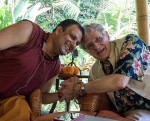
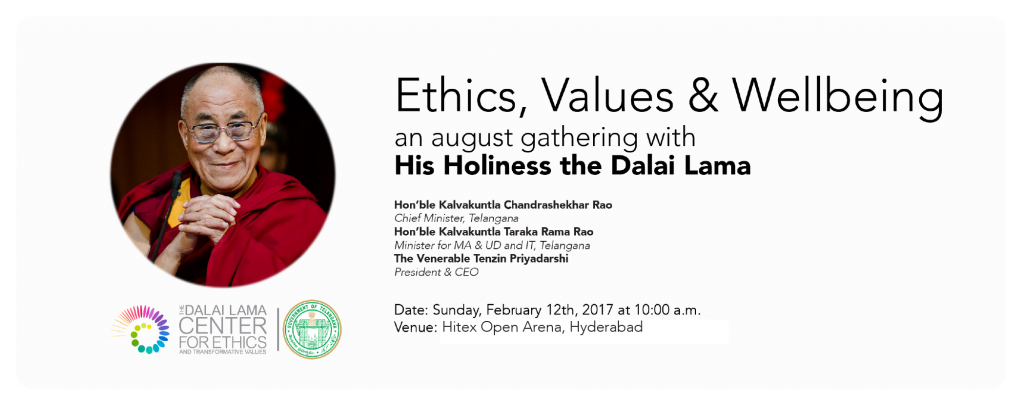

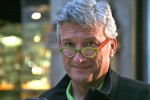

![toyama[3]](http://thecenter.mit.edu/wp-content/uploads/2012/05/toyama3-150x150.jpg)
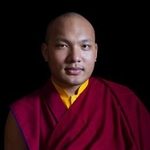
![donmorrison[2]](http://thecenter.mit.edu/wp-content/uploads/2012/05/donmorrison21.jpg)

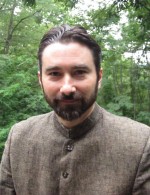
![tenzin2[1]](http://thecenter.mit.edu/wp-content/uploads/2012/05/tenzin21-150x150.jpg)

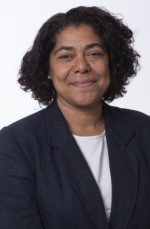















 World-renowned composer Tod Machover and architect/designer Neri Oxman, both from the MIT Media Lab, in collaboration with Buddhist monk Tenzin Prriyadarshi, Director of the Dalai Lama Center for Ethics and Transformative Values du MIT, invite the public into fascinating and intimate vocal experiences, to explore the relationship between human physiology-chemical phenomena in both body and sound vibrations, via unique design elements.
World-renowned composer Tod Machover and architect/designer Neri Oxman, both from the MIT Media Lab, in collaboration with Buddhist monk Tenzin Prriyadarshi, Director of the Dalai Lama Center for Ethics and Transformative Values du MIT, invite the public into fascinating and intimate vocal experiences, to explore the relationship between human physiology-chemical phenomena in both body and sound vibrations, via unique design elements. Partners:
Partners: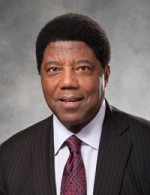
![goleman[1]](http://thecenter.mit.edu/wp-content/uploads/2012/05/goleman1-150x229.jpg)

![ancona[1]](http://thecenter.mit.edu/wp-content/uploads/2012/05/ancona1.jpg)

![donmorrison[2]](http://thecenter.mit.edu/wp-content/uploads/2012/05/donmorrison2.jpg)


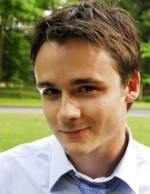


![]()
![]()













![toyama[1]](http://thecenter.mit.edu/wp-content/uploads/2012/05/toyama1-150x150.jpg)
![bhardwaj[1]](http://thecenter.mit.edu/wp-content/uploads/2012/05/bhardwaj1-150x150.jpg)

![shirin_ebadi[1]](http://thecenter.mit.edu/wp-content/uploads/2012/05/shirin_ebadi1-150x113.jpg)
![picard[1]](http://thecenter.mit.edu/wp-content/uploads/2012/03/picard1.jpg)
![barbasthasis[1]](http://thecenter.mit.edu/wp-content/uploads/2012/03/barbasthasis1.jpg)
![gomez-marquez[1]](http://thecenter.mit.edu/wp-content/uploads/2012/03/gomez-marquez1.jpg)
![sibley[1]](http://thecenter.mit.edu/wp-content/uploads/2012/03/sibley1.jpg)
![toyama[3]](http://thecenter.mit.edu/wp-content/uploads/2012/05/toyama3-150x150.jpg)
![mitsdm[1]](http://thecenter.mit.edu/wp-content/uploads/2012/05/mitsdm1.png)
![logo_mit-sloan[1]](http://thecenter.mit.edu/wp-content/uploads/2012/05/logo_mit-sloan1.jpg)
![]()
![regional_home[1]](http://thecenter.mit.edu/wp-content/uploads/2012/05/regional_home1.jpg)
![index[1]](http://thecenter.mit.edu/wp-content/uploads/2012/05/index1.jpg)
![MITRE[1]](http://thecenter.mit.edu/wp-content/uploads/2012/05/MITRE1.jpg)
![ilww[1]](http://thecenter.mit.edu/wp-content/uploads/2012/05/ilww1.jpg)
![]()


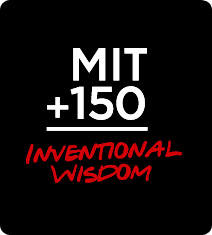
![hhdl[1]](http://thecenter.mit.edu/wp-content/uploads/2012/05/hhdl1.jpg)
![se[1]](http://thecenter.mit.edu/wp-content/uploads/2012/05/se1.jpg)
![jw[1]](http://thecenter.mit.edu/wp-content/uploads/2012/05/jw1.jpg)
![photo08[1]](http://thecenter.mit.edu/wp-content/uploads/2012/05/photo081-150x99.jpg)
![donmorrison[1]](http://thecenter.mit.edu/wp-content/uploads/2012/05/donmorrison1.jpg)
![medard[1]](http://thecenter.mit.edu/wp-content/uploads/2012/05/medard1.jpg)
![mphoatutu[1]](http://thecenter.mit.edu/wp-content/uploads/2012/05/mphoatutu1.jpg)
![mangano2[1]](http://thecenter.mit.edu/wp-content/uploads/2012/05/mangano21.jpg)
![taylor[1]](http://thecenter.mit.edu/wp-content/uploads/2012/05/taylor1.jpg)
![davidmwalker[1]](http://thecenter.mit.edu/wp-content/uploads/2012/05/davidmwalker1.jpg)
![phillipclay[1]](http://thecenter.mit.edu/wp-content/uploads/2012/05/phillipclay1.jpg)
![goleman[1]](http://thecenter.mit.edu/wp-content/uploads/2012/05/goleman1-150x229.jpg)
![bucciarelli[1]](http://thecenter.mit.edu/wp-content/uploads/2012/05/bucciarelli1.jpg)
![Elliot[1]](http://thecenter.mit.edu/wp-content/uploads/2012/05/Elliot1-150x128.jpg)
![mindell[1]](http://thecenter.mit.edu/wp-content/uploads/2012/05/mindell1.jpg)
![daniel_siegel[1]](http://thecenter.mit.edu/wp-content/uploads/2012/05/daniel_siegel1.jpg)
![crosby[1]](http://thecenter.mit.edu/wp-content/uploads/2012/05/crosby1.jpg)
![grodin-m[1]](http://thecenter.mit.edu/wp-content/uploads/2012/05/grodin-m1.gif)
![truog[1]](http://thecenter.mit.edu/wp-content/uploads/2012/05/truog1.jpg)
![goleman[1]](http://thecenter.mit.edu/wp-content/uploads/2012/05/goleman1-150x229.jpg)
![ancona[1]](http://thecenter.mit.edu/wp-content/uploads/2012/05/ancona1.jpg)
![norris[1]](http://thecenter.mit.edu/wp-content/uploads/2012/05/norris1.jpg)
![inam[1]](http://thecenter.mit.edu/wp-content/uploads/2012/05/inam1-150x150.jpg)
![poster-sinnombre[1]](http://thecenter.mit.edu/wp-content/uploads/2012/05/poster-sinnombre1.jpg)
![fukunaga[1]](http://thecenter.mit.edu/wp-content/uploads/2012/05/fukunaga1.jpg) Oakland native Cary Fukunaga studied history at University of California Santa Cruz and L’Institut d’Études Politiques (IEP) de Grenoble and Directing at New York University’s Tisch School of the Arts before winning a Student Academy Award for his short film Victoria Para Chino (2004).
Oakland native Cary Fukunaga studied history at University of California Santa Cruz and L’Institut d’Études Politiques (IEP) de Grenoble and Directing at New York University’s Tisch School of the Arts before winning a Student Academy Award for his short film Victoria Para Chino (2004).![chisholm[1]](http://thecenter.mit.edu/wp-content/uploads/2012/05/chisholm1-150x150.jpg)
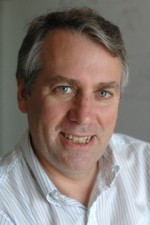
![edelong[1]](http://thecenter.mit.edu/wp-content/uploads/2012/05/edelong1.jpg)
![duster[1]](http://thecenter.mit.edu/wp-content/uploads/2012/05/duster1.jpg)
![entekhabi[1]](http://thecenter.mit.edu/wp-content/uploads/2012/05/entekhabi1.jpg)
![edelong[1]](http://thecenter.mit.edu/wp-content/uploads/2012/05/edelong1.jpg)
![alan-redshirt[1]](http://thecenter.mit.edu/wp-content/uploads/2012/05/alan-redshirt1-150x225.jpg)
![CliffordSaron[1]](http://thecenter.mit.edu/wp-content/uploads/2012/05/CliffordSaron1.jpg)
![alan-redshirt[1]](http://thecenter.mit.edu/wp-content/uploads/2012/05/alan-redshirt1-150x225.jpg)
![426.24.HH.7[1]](http://thecenter.mit.edu/wp-content/uploads/2012/05/426.24.HH_.71-201x300.jpg)
![benefitconcert_poster1[1]](http://thecenter.mit.edu/wp-content/uploads/2012/05/benefitconcert_poster11-234x300.jpg) Through his operas, his symphonies, his compositions for his own ensemble, and his wide-ranging collaborations with artists ranging from Twyla Tharp to Allen Ginsberg, Woody Allen to David Bowie, Philip Glass has had an extraordinary and unprecedented impact upon the musical and intellectual life of his times.
Through his operas, his symphonies, his compositions for his own ensemble, and his wide-ranging collaborations with artists ranging from Twyla Tharp to Allen Ginsberg, Woody Allen to David Bowie, Philip Glass has had an extraordinary and unprecedented impact upon the musical and intellectual life of his times.![goleman[1]](http://thecenter.mit.edu/wp-content/uploads/2012/05/goleman1-150x229.jpg)
![davidson[1]](http://thecenter.mit.edu/wp-content/uploads/2012/05/davidson1-150x186.jpg)
![keating1[1]](http://thecenter.mit.edu/wp-content/uploads/2012/05/keating11-150x112.jpg)
![michael_sandel[1]](http://thecenter.mit.edu/wp-content/uploads/2012/05/michael_sandel1-150x101.jpg)
![gilligan1[1]](http://thecenter.mit.edu/wp-content/uploads/2012/05/gilligan11.jpg)
![steven_hamburg[1]](http://thecenter.mit.edu/wp-content/uploads/2012/05/steven_hamburg1-150x150.jpg)

